#world first software engineer ai
Explore tagged Tumblr posts
Text
Explore the groundbreaking journey of Devin, the world's premier AI software engineer, on Web Idea Solution. Discover how Devin's innovative approach revolutionizes development, marking a significant milestone in the intersection of artificial intelligence and software engineering. Dive into the transformative potential of AI-driven programming and its implications for the future of technology.
#devin ai software engineer#what is devin ai#devin ai software engineer news#world first software engineer ai#what can devin ai do#how to access devin ai software engineer#will devin ai replace software engineers#devin ai website#how to access devin ai
0 notes
Text
If anyone wants to know why every tech company in the world right now is clamoring for AI like drowned rats scrabbling to board a ship, I decided to make a post to explain what's happening.
(Disclaimer to start: I'm a software engineer who's been employed full time since 2018. I am not a historian nor an overconfident Youtube essayist, so this post is my working knowledge of what I see around me and the logical bridges between pieces.)
Okay anyway. The explanation starts further back than what's going on now. I'm gonna start with the year 2000. The Dot Com Bubble just spectacularly burst. The model of "we get the users first, we learn how to profit off them later" went out in a no-money-having bang (remember this, it will be relevant later). A lot of money was lost. A lot of people ended up out of a job. A lot of startup companies went under. Investors left with a sour taste in their mouth and, in general, investment in the internet stayed pretty cooled for that decade. This was, in my opinion, very good for the internet as it was an era not suffocating under the grip of mega-corporation oligarchs and was, instead, filled with Club Penguin and I Can Haz Cheezburger websites.
Then around the 2010-2012 years, a few things happened. Interest rates got low, and then lower. Facebook got huge. The iPhone took off. And suddenly there was a huge new potential market of internet users and phone-havers, and the cheap money was available to start backing new tech startup companies trying to hop on this opportunity. Companies like Uber, Netflix, and Amazon either started in this time, or hit their ramp-up in these years by shifting focus to the internet and apps.
Now, every start-up tech company dreaming of being the next big thing has one thing in common: they need to start off by getting themselves massively in debt. Because before you can turn a profit you need to first spend money on employees and spend money on equipment and spend money on data centers and spend money on advertising and spend money on scale and and and
But also, everyone wants to be on the ship for The Next Big Thing that takes off to the moon.
So there is a mutual interest between new tech companies, and venture capitalists who are willing to invest $$$ into said new tech companies. Because if the venture capitalists can identify a prize pig and get in early, that money could come back to them 100-fold or 1,000-fold. In fact it hardly matters if they invest in 10 or 20 total bust projects along the way to find that unicorn.
But also, becoming profitable takes time. And that might mean being in debt for a long long time before that rocket ship takes off to make everyone onboard a gazzilionaire.
But luckily, for tech startup bros and venture capitalists, being in debt in the 2010's was cheap, and it only got cheaper between 2010 and 2020. If people could secure loans for ~3% or 4% annual interest, well then a $100,000 loan only really costs $3,000 of interest a year to keep afloat. And if inflation is higher than that or at least similar, you're still beating the system.
So from 2010 through early 2022, times were good for tech companies. Startups could take off with massive growth, showing massive potential for something, and venture capitalists would throw infinite money at them in the hopes of pegging just one winner who will take off. And supporting the struggling investments or the long-haulers remained pretty cheap to keep funding.
You hear constantly about "Such and such app has 10-bazillion users gained over the last 10 years and has never once been profitable", yet the thing keeps chugging along because the investors backing it aren't stressed about the immediate future, and are still banking on that "eventually" when it learns how to really monetize its users and turn that profit.
The pandemic in 2020 took a magnifying-glass-in-the-sun effect to this, as EVERYTHING was forcibly turned online which pumped a ton of money and workers into tech investment. Simultaneously, money got really REALLY cheap, bottoming out with historic lows for interest rates.
Then the tide changed with the massive inflation that struck late 2021. Because this all-gas no-brakes state of things was also contributing to off-the-rails inflation (along with your standard-fare greedflation and price gouging, given the extremely convenient excuses of pandemic hardships and supply chain issues). The federal reserve whipped out interest rate hikes to try to curb this huge inflation, which is like a fire extinguisher dousing and suffocating your really-cool, actively-on-fire party where everyone else is burning but you're in the pool. And then they did this more, and then more. And the financial climate followed suit. And suddenly money was not cheap anymore, and new loans became expensive, because loans that used to compound at 2% a year are now compounding at 7 or 8% which, in the language of compounding, is a HUGE difference. A $100,000 loan at a 2% interest rate, if not repaid a single cent in 10 years, accrues to $121,899. A $100,000 loan at an 8% interest rate, if not repaid a single cent in 10 years, more than doubles to $215,892.
Now it is scary and risky to throw money at "could eventually be profitable" tech companies. Now investors are watching companies burn through their current funding and, when the companies come back asking for more, investors are tightening their coin purses instead. The bill is coming due. The free money is drying up and companies are under compounding pressure to produce a profit for their waiting investors who are now done waiting.
You get enshittification. You get quality going down and price going up. You get "now that you're a captive audience here, we're forcing ads or we're forcing subscriptions on you." Don't get me wrong, the plan was ALWAYS to monetize the users. It's just that it's come earlier than expected, with way more feet-to-the-fire than these companies were expecting. ESPECIALLY with Wall Street as the other factor in funding (public) companies, where Wall Street exhibits roughly the same temperament as a baby screaming crying upset that it's soiled its own diaper (maybe that's too mean a comparison to babies), and now companies are being put through the wringer for anything LESS than infinite growth that Wall Street demands of them.
Internal to the tech industry, you get MASSIVE wide-spread layoffs. You get an industry that used to be easy to land multiple job offers shriveling up and leaving recent graduates in a desperately awful situation where no company is hiring and the market is flooded with laid-off workers trying to get back on their feet.
Because those coin-purse-clutching investors DO love virtue-signaling efforts from companies that say "See! We're not being frivolous with your money! We only spend on the essentials." And this is true even for MASSIVE, PROFITABLE companies, because those companies' value is based on the Rich Person Feeling Graph (their stock) rather than the literal profit money. A company making a genuine gazillion dollars a year still tears through layoffs and freezes hiring and removes the free batteries from the printer room (totally not speaking from experience, surely) because the investors LOVE when you cut costs and take away employee perks. The "beer on tap, ping pong table in the common area" era of tech is drying up. And we're still unionless.
Never mind that last part.
And then in early 2023, AI (more specifically, Chat-GPT which is OpenAI's Large Language Model creation) tears its way into the tech scene with a meteor's amount of momentum. Here's Microsoft's prize pig, which it invested heavily in and is galivanting around the pig-show with, to the desperate jealousy and rapture of every other tech company and investor wishing it had that pig. And for the first time since the interest rate hikes, investors have dollar signs in their eyes, both venture capital and Wall Street alike. They're willing to restart the hose of money (even with the new risk) because this feels big enough for them to take the risk.
Now all these companies, who were in varying stages of sweating as their bill came due, or wringing their hands as their stock prices tanked, see a single glorious gold-plated rocket up out of here, the likes of which haven't been seen since the free money days. It's their ticket to buy time, and buy investors, and say "see THIS is what will wring money forth, finally, we promise, just let us show you."
To be clear, AI is NOT profitable yet. It's a money-sink. Perhaps a money-black-hole. But everyone in the space is so wowed by it that there is a wide-spread and powerful conviction that it will become profitable and earn its keep. (Let's be real, half of that profit "potential" is the promise of automating away jobs of pesky employees who peskily cost money.) It's a tech-space industrial revolution that will automate away skilled jobs, and getting in on the ground floor is the absolute best thing you can do to get your pie slice's worth.
It's the thing that will win investors back. It's the thing that will get the investment money coming in again (or, get it second-hand if the company can be the PROVIDER of something needed for AI, which other companies with venture-back will pay handsomely for). It's the thing companies are terrified of missing out on, lest it leave them utterly irrelevant in a future where not having AI-integration is like not having a mobile phone app for your company or not having a website.
So I guess to reiterate on my earlier point:
Drowned rats. Swimming to the one ship in sight.
36K notes
·
View notes
Text
#devin#devin world's first AI software engineer#world's first AI software engineer#he Future of Software Engineering#Devin AI
1 note
·
View note
Text
"As a Deaf man, Adam Munder has long been advocating for communication rights in a world that chiefly caters to hearing people.
The Intel software engineer and his wife — who is also Deaf — are often unable to use American Sign Language in daily interactions, instead defaulting to texting on a smartphone or passing a pen and paper back and forth with service workers, teachers, and lawyers.
It can make simple tasks, like ordering coffee, more complicated than it should be.
But there are life events that hold greater weight than a cup of coffee.
Recently, Munder and his wife took their daughter in for a doctor’s appointment — and no interpreter was available.
To their surprise, their doctor said: “It’s alright, we’ll just have your daughter interpret for you!” ...
That day at the doctor’s office came at the heels of a thousand frustrating interactions and miscommunications — and Munder is not isolated in his experience.
“Where I live in Arizona, there are more than 1.1 million individuals with a hearing loss,” Munder said, “and only about 400 licensed interpreters.”
In addition to being hard to find, interpreters are expensive. And texting and writing aren’t always practical options — they leave out the emotion, detail, and nuance of a spoken conversation.
ASL is a rich, complex language with its own grammar and culture; a subtle change in speed, direction, facial expression, or gesture can completely change the meaning and tone of a sign.
“Writing back and forth on paper and pen or using a smartphone to text is not equivalent to American Sign Language,” Munder emphasized. “The details and nuance that make us human are lost in both our personal and business conversations.”
His solution? An AI-powered platform called Omnibridge.
“My team has established this bridge between the Deaf world and the hearing world, bringing these worlds together without forcing one to adapt to the other,” Munder said.
Trained on thousands of signs, Omnibridge is engineered to transcribe spoken English and interpret sign language on screen in seconds...
“Our dream is that the technology will be available to everyone, everywhere,” Munder said. “I feel like three to four years from now, we're going to have an app on a phone. Our team has already started working on a cloud-based product, and we're hoping that will be an easy switch from cloud to mobile to an app.” ...
At its heart, Omnibridge is a testament to the positive capabilities of artificial intelligence. "
-via GoodGoodGood, October 25, 2024. More info below the cut!
To test an alpha version of his invention, Munder welcomed TED associate Hasiba Haq on stage.
“I want to show you how this could have changed my interaction at the doctor appointment, had this been available,” Munder said.
He went on to explain that the software would generate a bi-directional conversation, in which Munder’s signs would appear as blue text and spoken word would appear in gray.
At first, there was a brief hiccup on the TED stage. Haq, who was standing in as the doctor’s office receptionist, spoke — but the screen remained blank.
“I don’t believe this; this is the first time that AI has ever failed,” Munder joked, getting a big laugh from the crowd. “Thanks for your patience.”
After a quick reboot, they rolled with the punches and tried again.
Haq asked: “Hi, how’s it going?”
Her words popped up in blue.
Munder signed in reply: “I am good.”
His response popped up in gray.
Back and forth, they recreated the scene from the doctor’s office. But this time Munder retained his autonomy, and no one suggested a 7-year-old should play interpreter.
Munder’s TED debut and tech demonstration didn’t happen overnight — the engineer has been working on Omnibridge for over a decade.
“It takes a lot to build something like this,” Munder told Good Good Good in an exclusive interview, communicating with our team in ASL. “It couldn't just be one or two people. It takes a large team, a lot of resources, millions and millions of dollars to work on a project like this.”
After five years of pitching and research, Intel handpicked Munder’s team for a specialty training program. It was through that backing that Omnibridge began to truly take shape...
“Our dream is that the technology will be available to everyone, everywhere,” Munder said. “I feel like three to four years from now, we're going to have an app on a phone. Our team has already started working on a cloud-based product, and we're hoping that will be an easy switch from cloud to mobile to an app.”
In order to achieve that dream — of transposing their technology to a smartphone — Munder and his team have to play a bit of a waiting game. Today, their platform necessitates building the technology on a PC, with an AI engine.
“A lot of things don't have those AI PC types of chips,” Munder explained. “But as the technology evolves, we expect that smartphones will start to include AI engines. They'll start to include the capability in processing within smartphones. It will take time for the technology to catch up to it, and it probably won't need the power that we're requiring right now on a PC.”
At its heart, Omnibridge is a testament to the positive capabilities of artificial intelligence.
But it is more than a transcription service — it allows people to have face-to-face conversations with each other. There’s a world of difference between passing around a phone or pen and paper and looking someone in the eyes when you speak to them.
It also allows Deaf people to speak ASL directly, without doing the mental gymnastics of translating their words into English.
“For me, English is my second language,” Munder told Good Good Good. “So when I write in English, I have to think: How am I going to adjust the words? How am I going to write it just right so somebody can understand me? It takes me some time and effort, and it's hard for me to express myself actually in doing that. This technology allows someone to be able to express themselves in their native language.”
Ultimately, Munder said that Omnibridge is about “bringing humanity back” to these conversations.
“We’re changing the world through the power of AI, not just revolutionizing technology, but enhancing that human connection,” Munder said at the end of his TED Talk.
“It’s two languages,” he concluded, “signed and spoken, in one seamless conversation.”"
-via GoodGoodGood, October 25, 2024
#ai#pro ai#deaf#asl#disability#translation#disabled#hard of hearing#hearing impairment#sign language#american sign language#languages#tech news#language#communication#good news#hope#machine learning
517 notes
·
View notes
Text
AI “art” and uncanniness

TOMORROW (May 14), I'm on a livecast about AI AND ENSHITTIFICATION with TIM O'REILLY; on TOMORROW (May 15), I'm in NORTH HOLLYWOOD for a screening of STEPHANIE KELTON'S FINDING THE MONEY; FRIDAY (May 17), I'm at the INTERNET ARCHIVE in SAN FRANCISCO to keynote the 10th anniversary of the AUTHORS ALLIANCE.

When it comes to AI art (or "art"), it's hard to find a nuanced position that respects creative workers' labor rights, free expression, copyright law's vital exceptions and limitations, and aesthetics.
I am, on balance, opposed to AI art, but there are some important caveats to that position. For starters, I think it's unequivocally wrong – as a matter of law – to say that scraping works and training a model with them infringes copyright. This isn't a moral position (I'll get to that in a second), but rather a technical one.
Break down the steps of training a model and it quickly becomes apparent why it's technically wrong to call this a copyright infringement. First, the act of making transient copies of works – even billions of works – is unequivocally fair use. Unless you think search engines and the Internet Archive shouldn't exist, then you should support scraping at scale:
https://pluralistic.net/2023/09/17/how-to-think-about-scraping/
And unless you think that Facebook should be allowed to use the law to block projects like Ad Observer, which gathers samples of paid political disinformation, then you should support scraping at scale, even when the site being scraped objects (at least sometimes):
https://pluralistic.net/2021/08/06/get-you-coming-and-going/#potemkin-research-program
After making transient copies of lots of works, the next step in AI training is to subject them to mathematical analysis. Again, this isn't a copyright violation.
Making quantitative observations about works is a longstanding, respected and important tool for criticism, analysis, archiving and new acts of creation. Measuring the steady contraction of the vocabulary in successive Agatha Christie novels turns out to offer a fascinating window into her dementia:
https://www.theguardian.com/books/2009/apr/03/agatha-christie-alzheimers-research
Programmatic analysis of scraped online speech is also critical to the burgeoning formal analyses of the language spoken by minorities, producing a vibrant account of the rigorous grammar of dialects that have long been dismissed as "slang":
https://www.researchgate.net/publication/373950278_Lexicogrammatical_Analysis_on_African-American_Vernacular_English_Spoken_by_African-Amecian_You-Tubers
Since 1988, UCL Survey of English Language has maintained its "International Corpus of English," and scholars have plumbed its depth to draw important conclusions about the wide variety of Englishes spoken around the world, especially in postcolonial English-speaking countries:
https://www.ucl.ac.uk/english-usage/projects/ice.htm
The final step in training a model is publishing the conclusions of the quantitative analysis of the temporarily copied documents as software code. Code itself is a form of expressive speech – and that expressivity is key to the fight for privacy, because the fact that code is speech limits how governments can censor software:
https://www.eff.org/deeplinks/2015/04/remembering-case-established-code-speech/
Are models infringing? Well, they certainly can be. In some cases, it's clear that models "memorized" some of the data in their training set, making the fair use, transient copy into an infringing, permanent one. That's generally considered to be the result of a programming error, and it could certainly be prevented (say, by comparing the model to the training data and removing any memorizations that appear).
Not every seeming act of memorization is a memorization, though. While specific models vary widely, the amount of data from each training item retained by the model is very small. For example, Midjourney retains about one byte of information from each image in its training data. If we're talking about a typical low-resolution web image of say, 300kb, that would be one three-hundred-thousandth (0.0000033%) of the original image.
Typically in copyright discussions, when one work contains 0.0000033% of another work, we don't even raise the question of fair use. Rather, we dismiss the use as de minimis (short for de minimis non curat lex or "The law does not concern itself with trifles"):
https://en.wikipedia.org/wiki/De_minimis
Busting someone who takes 0.0000033% of your work for copyright infringement is like swearing out a trespassing complaint against someone because the edge of their shoe touched one blade of grass on your lawn.
But some works or elements of work appear many times online. For example, the Getty Images watermark appears on millions of similar images of people standing on red carpets and runways, so a model that takes even in infinitesimal sample of each one of those works might still end up being able to produce a whole, recognizable Getty Images watermark.
The same is true for wire-service articles or other widely syndicated texts: there might be dozens or even hundreds of copies of these works in training data, resulting in the memorization of long passages from them.
This might be infringing (we're getting into some gnarly, unprecedented territory here), but again, even if it is, it wouldn't be a big hardship for model makers to post-process their models by comparing them to the training set, deleting any inadvertent memorizations. Even if the resulting model had zero memorizations, this would do nothing to alleviate the (legitimate) concerns of creative workers about the creation and use of these models.
So here's the first nuance in the AI art debate: as a technical matter, training a model isn't a copyright infringement. Creative workers who hope that they can use copyright law to prevent AI from changing the creative labor market are likely to be very disappointed in court:
https://www.hollywoodreporter.com/business/business-news/sarah-silverman-lawsuit-ai-meta-1235669403/
But copyright law isn't a fixed, eternal entity. We write new copyright laws all the time. If current copyright law doesn't prevent the creation of models, what about a future copyright law?
Well, sure, that's a possibility. The first thing to consider is the possible collateral damage of such a law. The legal space for scraping enables a wide range of scholarly, archival, organizational and critical purposes. We'd have to be very careful not to inadvertently ban, say, the scraping of a politician's campaign website, lest we enable liars to run for office and renege on their promises, while they insist that they never made those promises in the first place. We wouldn't want to abolish search engines, or stop creators from scraping their own work off sites that are going away or changing their terms of service.
Now, onto quantitative analysis: counting words and measuring pixels are not activities that you should need permission to perform, with or without a computer, even if the person whose words or pixels you're counting doesn't want you to. You should be able to look as hard as you want at the pixels in Kate Middleton's family photos, or track the rise and fall of the Oxford comma, and you shouldn't need anyone's permission to do so.
Finally, there's publishing the model. There are plenty of published mathematical analyses of large corpuses that are useful and unobjectionable. I love me a good Google n-gram:
https://books.google.com/ngrams/graph?content=fantods%2C+heebie-jeebies&year_start=1800&year_end=2019&corpus=en-2019&smoothing=3
And large language models fill all kinds of important niches, like the Human Rights Data Analysis Group's LLM-based work helping the Innocence Project New Orleans' extract data from wrongful conviction case files:
https://hrdag.org/tech-notes/large-language-models-IPNO.html
So that's nuance number two: if we decide to make a new copyright law, we'll need to be very sure that we don't accidentally crush these beneficial activities that don't undermine artistic labor markets.
This brings me to the most important point: passing a new copyright law that requires permission to train an AI won't help creative workers get paid or protect our jobs.
Getty Images pays photographers the least it can get away with. Publishers contracts have transformed by inches into miles-long, ghastly rights grabs that take everything from writers, but still shifts legal risks onto them:
https://pluralistic.net/2022/06/19/reasonable-agreement/
Publishers like the New York Times bitterly oppose their writers' unions:
https://actionnetwork.org/letters/new-york-times-stop-union-busting
These large corporations already control the copyrights to gigantic amounts of training data, and they have means, motive and opportunity to license these works for training a model in order to pay us less, and they are engaged in this activity right now:
https://www.nytimes.com/2023/12/22/technology/apple-ai-news-publishers.html
Big games studios are already acting as though there was a copyright in training data, and requiring their voice actors to begin every recording session with words to the effect of, "I hereby grant permission to train an AI with my voice" and if you don't like it, you can hit the bricks:
https://www.vice.com/en/article/5d37za/voice-actors-sign-away-rights-to-artificial-intelligence
If you're a creative worker hoping to pay your bills, it doesn't matter whether your wages are eroded by a model produced without paying your employer for the right to do so, or whether your employer got to double dip by selling your work to an AI company to train a model, and then used that model to fire you or erode your wages:
https://pluralistic.net/2023/02/09/ai-monkeys-paw/#bullied-schoolkids
Individual creative workers rarely have any bargaining leverage over the corporations that license our copyrights. That's why copyright's 40-year expansion (in duration, scope, statutory damages) has resulted in larger, more profitable entertainment companies, and lower payments – in real terms and as a share of the income generated by their work – for creative workers.
As Rebecca Giblin and I write in our book Chokepoint Capitalism, giving creative workers more rights to bargain with against giant corporations that control access to our audiences is like giving your bullied schoolkid extra lunch money – it's just a roundabout way of transferring that money to the bullies:
https://pluralistic.net/2022/08/21/what-is-chokepoint-capitalism/
There's an historical precedent for this struggle – the fight over music sampling. 40 years ago, it wasn't clear whether sampling required a copyright license, and early hip-hop artists took samples without permission, the way a horn player might drop a couple bars of a well-known song into a solo.
Many artists were rightfully furious over this. The "heritage acts" (the music industry's euphemism for "Black people") who were most sampled had been given very bad deals and had seen very little of the fortunes generated by their creative labor. Many of them were desperately poor, despite having made millions for their labels. When other musicians started making money off that work, they got mad.
In the decades that followed, the system for sampling changed, partly through court cases and partly through the commercial terms set by the Big Three labels: Sony, Warner and Universal, who control 70% of all music recordings. Today, you generally can't sample without signing up to one of the Big Three (they are reluctant to deal with indies), and that means taking their standard deal, which is very bad, and also signs away your right to control your samples.
So a musician who wants to sample has to sign the bad terms offered by a Big Three label, and then hand $500 out of their advance to one of those Big Three labels for the sample license. That $500 typically doesn't go to another artist – it goes to the label, who share it around their executives and investors. This is a system that makes every artist poorer.
But it gets worse. Putting a price on samples changes the kind of music that can be economically viable. If you wanted to clear all the samples on an album like Public Enemy's "It Takes a Nation of Millions To Hold Us Back," or the Beastie Boys' "Paul's Boutique," you'd have to sell every CD for $150, just to break even:
https://memex.craphound.com/2011/07/08/creative-license-how-the-hell-did-sampling-get-so-screwed-up-and-what-the-hell-do-we-do-about-it/
Sampling licenses don't just make every artist financially worse off, they also prevent the creation of music of the sort that millions of people enjoy. But it gets even worse. Some older, sample-heavy music can't be cleared. Most of De La Soul's catalog wasn't available for 15 years, and even though some of their seminal music came back in March 2022, the band's frontman Trugoy the Dove didn't live to see it – he died in February 2022:
https://www.vulture.com/2023/02/de-la-soul-trugoy-the-dove-dead-at-54.html
This is the third nuance: even if we can craft a model-banning copyright system that doesn't catch a lot of dolphins in its tuna net, it could still make artists poorer off.
Back when sampling started, it wasn't clear whether it would ever be considered artistically important. Early sampling was crude and experimental. Musicians who trained for years to master an instrument were dismissive of the idea that clicking a mouse was "making music." Today, most of us don't question the idea that sampling can produce meaningful art – even musicians who believe in licensing samples.
Having lived through that era, I'm prepared to believe that maybe I'll look back on AI "art" and say, "damn, I can't believe I never thought that could be real art."
But I wouldn't give odds on it.
I don't like AI art. I find it anodyne, boring. As Henry Farrell writes, it's uncanny, and not in a good way:
https://www.programmablemutter.com/p/large-language-models-are-uncanny
Farrell likens the work produced by AIs to the movement of a Ouija board's planchette, something that "seems to have a life of its own, even though its motion is a collective side-effect of the motions of the people whose fingers lightly rest on top of it." This is "spooky-action-at-a-close-up," transforming "collective inputs … into apparently quite specific outputs that are not the intended creation of any conscious mind."
Look, art is irrational in the sense that it speaks to us at some non-rational, or sub-rational level. Caring about the tribulations of imaginary people or being fascinated by pictures of things that don't exist (or that aren't even recognizable) doesn't make any sense. There's a way in which all art is like an optical illusion for our cognition, an imaginary thing that captures us the way a real thing might.
But art is amazing. Making art and experiencing art makes us feel big, numinous, irreducible emotions. Making art keeps me sane. Experiencing art is a precondition for all the joy in my life. Having spent most of my life as a working artist, I've come to the conclusion that the reason for this is that art transmits an approximation of some big, numinous irreducible emotion from an artist's mind to our own. That's it: that's why art is amazing.
AI doesn't have a mind. It doesn't have an intention. The aesthetic choices made by AI aren't choices, they're averages. As Farrell writes, "LLM art sometimes seems to communicate a message, as art does, but it is unclear where that message comes from, or what it means. If it has any meaning at all, it is a meaning that does not stem from organizing intention" (emphasis mine).
Farrell cites Mark Fisher's The Weird and the Eerie, which defines "weird" in easy to understand terms ("that which does not belong") but really grapples with "eerie."
For Fisher, eeriness is "when there is something present where there should be nothing, or is there is nothing present when there should be something." AI art produces the seeming of intention without intending anything. It appears to be an agent, but it has no agency. It's eerie.
Fisher talks about capitalism as eerie. Capital is "conjured out of nothing" but "exerts more influence than any allegedly substantial entity." The "invisible hand" shapes our lives more than any person. The invisible hand is fucking eerie. Capitalism is a system in which insubstantial non-things – corporations – appear to act with intention, often at odds with the intentions of the human beings carrying out those actions.
So will AI art ever be art? I don't know. There's a long tradition of using random or irrational or impersonal inputs as the starting point for human acts of artistic creativity. Think of divination:
https://pluralistic.net/2022/07/31/divination/
Or Brian Eno's Oblique Strategies:
http://stoney.sb.org/eno/oblique.html
I love making my little collages for this blog, though I wouldn't call them important art. Nevertheless, piecing together bits of other peoples' work can make fantastic, important work of historical note:
https://www.johnheartfield.com/John-Heartfield-Exhibition/john-heartfield-art/famous-anti-fascist-art/heartfield-posters-aiz
Even though painstakingly cutting out tiny elements from others' images can be a meditative and educational experience, I don't think that using tiny scissors or the lasso tool is what defines the "art" in collage. If you can automate some of this process, it could still be art.
Here's what I do know. Creating an individual bargainable copyright over training will not improve the material conditions of artists' lives – all it will do is change the relative shares of the value we create, shifting some of that value from tech companies that hate us and want us to starve to entertainment companies that hate us and want us to starve.
As an artist, I'm foursquare against anything that stands in the way of making art. As an artistic worker, I'm entirely committed to things that help workers get a fair share of the money their work creates, feed their families and pay their rent.
I think today's AI art is bad, and I think tomorrow's AI art will probably be bad, but even if you disagree (with either proposition), I hope you'll agree that we should be focused on making sure art is legal to make and that artists get paid for it.
Just because copyright won't fix the creative labor market, it doesn't follow that nothing will. If we're worried about labor issues, we can look to labor law to improve our conditions. That's what the Hollywood writers did, in their groundbreaking 2023 strike:
https://pluralistic.net/2023/10/01/how-the-writers-guild-sunk-ais-ship/
Now, the writers had an advantage: they are able to engage in "sectoral bargaining," where a union bargains with all the major employers at once. That's illegal in nearly every other kind of labor market. But if we're willing to entertain the possibility of getting a new copyright law passed (that won't make artists better off), why not the possibility of passing a new labor law (that will)? Sure, our bosses won't lobby alongside of us for more labor protection, the way they would for more copyright (think for a moment about what that says about who benefits from copyright versus labor law expansion).
But all workers benefit from expanded labor protection. Rather than going to Congress alongside our bosses from the studios and labels and publishers to demand more copyright, we could go to Congress alongside every kind of worker, from fast-food cashiers to publishing assistants to truck drivers to demand the right to sectoral bargaining. That's a hell of a coalition.
And if we do want to tinker with copyright to change the way training works, let's look at collective licensing, which can't be bargained away, rather than individual rights that can be confiscated at the entrance to our publisher, label or studio's offices. These collective licenses have been a huge success in protecting creative workers:
https://pluralistic.net/2023/02/26/united-we-stand/
Then there's copyright's wildest wild card: The US Copyright Office has repeatedly stated that works made by AIs aren't eligible for copyright, which is the exclusive purview of works of human authorship. This has been affirmed by courts:
https://pluralistic.net/2023/08/20/everything-made-by-an-ai-is-in-the-public-domain/
Neither AI companies nor entertainment companies will pay creative workers if they don't have to. But for any company contemplating selling an AI-generated work, the fact that it is born in the public domain presents a substantial hurdle, because anyone else is free to take that work and sell it or give it away.
Whether or not AI "art" will ever be good art isn't what our bosses are thinking about when they pay for AI licenses: rather, they are calculating that they have so much market power that they can sell whatever slop the AI makes, and pay less for the AI license than they would make for a human artist's work. As is the case in every industry, AI can't do an artist's job, but an AI salesman can convince an artist's boss to fire the creative worker and replace them with AI:
https://pluralistic.net/2024/01/29/pay-no-attention/#to-the-little-man-behind-the-curtain
They don't care if it's slop – they just care about their bottom line. A studio executive who cancels a widely anticipated film prior to its release to get a tax-credit isn't thinking about artistic integrity. They care about one thing: money. The fact that AI works can be freely copied, sold or given away may not mean much to a creative worker who actually makes their own art, but I assure you, it's the only thing that matters to our bosses.

If you'd like an essay-formatted version of this post to read or share, here's a link to it on pluralistic.net, my surveillance-free, ad-free, tracker-free blog:
https://pluralistic.net/2024/05/13/spooky-action-at-a-close-up/#invisible-hand
#pluralistic#ai art#eerie#ai#weird#henry farrell#copyright#copyfight#creative labor markets#what is art#ideomotor response#mark fisher#invisible hand#uncanniness#prompting
270 notes
·
View notes
Text
thrifted romance | megumi fushiguro x reader

synopsis: you’ve never really spoken with megumi before, so when your friends leave the two of you behind on a snowy night, you take the opportunity to get to know him.
wc: 6.2k... SO SORRY I GOT CARRIED AWAY cw: swearing, college au, noncurse au, i don’t thjnk there’s anything else ??

this got way longer than i intended it to be and i rushed to grind it out so it may not be coherent.. if so i apologize :’3 and this one’s late but i hope the content makes up for it ! enjoy meemow barely proofread!

it's a late winter evening when you meet up with megumi and your friends on the side of the street— cozied up in puffy layers and a long blazer stained with coffee splashes and a few hot chocolate smudges here and there.
fall had melted away with the slow gradient of leaves from the trees, sinking into fluffy piles on the sidewalk that soon became coated and replaced with light snowfall; the first of many problematic inches. midterms were just around the corner, and with it meant late hours spent pulling all-nighters that left you exhausted, eyes dark around the edges with a lack of sleep; breaths of minty hot chocolate and coffee from the amalgamation you'd concocted to at least pretend to get into the holiday spirit.
(a fruitless effort, though— if not for your failure that warned you to stay out of mixology, but the way your roommate's cat had knocked over your mug and ruined the flashcards you'd been wrestling with and looked completely smug with itself.)
really, though, there was absolutely nothing jolly about school, or exams. so when your favorite inefficient, sidetracking study buddy had offered to spend the weekend out, who were you to say no? nobara had offered to go find a club, but it was far too cold out to frolic around in skimpy clothing and your expensive winter coats were much too valuable to risk being stolen in the haze of drunken students and sweaty bodies. so, you'd decided to go shopping, because what else is there to do with her? besides the usual karaoke session with the upperclassmen she seems to like so much, of course.
turns out, it'd had been a group endeavor. or, more accurately— a group of four, unlike the duo you had previously thought you'd be going out in. yuji and megumi were there too— friends from separate majors; you'd heard that yuji was involved in the uprising surge of software engineers and computer science majors clambering for a shot in the world of big AI tech companies, even though he supposedly was about as computer-smart as your teetering old grandma ripe with age, permanently stuck in her rocking chair crocheting the days away.
megumi, on the other hand, was a mystery. you'd shared a few classes together; his chipped dark nails that shone the same blue as his esoteric eyes beneath the warmth of the glowing sun, and his inky black hair that spilled over the collars of his simple gray sweatshirts like effortlessly graceful calligraphy on paper had captured your attention as smooth and seamless as the daylight turned to darkness, days cut short by the onslaught of cold. even so, you'd never brought yourself to interact much— he seemed like he'd prefer to keep to himself, if the way he'd disdainfully scoot away from anyone who tried to approach him and turn up the volume of his headphones indicated anything. you had laughed to your friend and called it introversion to its finest, only to promptly shut up when his unmoving gaze landed on you, leaving you feeling like a clown on the stage, rimmed by rich dark red curtains and a wooden floorboard as the beaming spotlight shines upon you imaginary button nose, hot and glaring under his gaze.
even though you'd approved of his music taste once you snagged a few notes by the ear, you'd really thought his taste in fashion was too bland to be the type of person to shop with nobara— her meticulous style and image were much brighter and more flamboyant than megumi's jaded attempts at a splash of color through the occasional blue argyle or layered turtleneck. still, those were better than yuji's paltry attempts at fashion; at least the myriads of color on nobara's figure were coordinated. the pink-haired boy with funny scars on his face would probably have been better off learning graphic design or art, with the disasters of clashing colors on his person.
and he'd gotten the opportunity to demonstrate his questionable tastes on the chilly evening, when black ice had begun to form on the roads and the soft light of boutiques with slow jazz flowing from the speakers filled your frost-bitten red ears as you walked up to the shade of a nearby lamppost. once you'd all met up, nobara had hooked an arm around your elbow and dragged you off, leaving the boys to follow along like it was walking dogs.
honestly, you wouldn't be surprised if you were— at least, with yuji. he carried nobara's bags like she was the next princess in line, without complaint and with the little fearful quivers that dogs get in their legs whenever their owners scold them for barking or misbehaving, much like how nobara would yell at yuji if he dropped a single cream linen sweater or ruffled pink cami.
megumi, on the other hand, was far too lethargic and quiet to be considered any kind of canine. although the weaved bracelet on his left wrist with a cute little puppy charm you caught sight of when he'd rolled his sleeve up implied otherwise. the only reason he'd even had to do that was to rub the sickeningly sweet orange blossom hand sanitizer nobara had spritzed on each of your palms after you took turns petting a stray cat, one that seemed to take a great liking to you and megumi in particular.
the night seemed to drag on forever; pale yellow lights and holiday decorations blurred into swathes and bubbles of color in your vision as the hours passed and the caffeine from the cute little coffeeshop you'd stopped at earlier began to wear off.
but there had just been something magical about that evening; spending time with friends (albeit, more like acquaintances) had granted you a much-needed break from cramming your mind with an overflow of information that was sure to spill out the moment you answered the last exam question. so, when it was almost midnight and it was time to retire to your bed, you'd insisted on staying out for just a little longer while nobara and the rest returned to their dorms to catch some sleep. yuji had complained something about his legs cramping, but you were feeling giddy, and the stars were twinkling just as bright as the light in nobara's eyes were when you told her you had to soak in the fresh air for as long as you could before being locked in to study again as she laughed and headed home with her pink dog-boy escort in tow.
megumi had mumbled something about staying with you since it was late and he wanted to make sure you were safe. you didn't think too much about it, because if you did, you were sure you'd end up with a faced even more flushed than it was frostbitten from the cold.
so, here you were, strolling down the quieter side of town, a brooding boy with inky dark hair and hands pale with blue veins shoved into the pockets of his jacket trailing behind you. he had one airpod tucked into his pierced ear; you assumed he hadn't brought his headphones because yuji would be there to prattle and babble. even so, you were content not to say anything, so there was plenty of opportunity for him to wear both. but he wasn't. you decided not to linger on it.
you'd just finished writing a silly little note out of the crisp snow gathered on the windshield of some stranger's car; the flakes were cold and biting on your skin, leaving it feeling numb with little droplets of icy water when you pulled away to admire your handiwork.
"actually, maybe i shouldn't be doing that." you decided after a moment, mumbling under your breath. it was just a little message with a whiskered smiley face, but the headlights on the car and the bumper seemed to form a frown at you when you stepped back, shaking its motorized head at your vandalism.
"you think?"
megumi's voice sounded from behind you, a little weighed down by the cold with a wisp of warmth leaving his lips like a powdery exhale, curling into the prickly night air. he was standing on the sidewalk, observing you all prickly-like as if you were some flagrant toddler he was babysitting. you still had to get used to the way his voice sounded after rarely hearing it; the few crumbs you got when your professors forced obligatory presentations onto struggling students had sent this warm, fuzzy feeling collecting in your stomach at the rich tone of velvet it held. not rough or overly deep, but smooth and reassuring. the kind you could fall asleep to; like there was a lullaby just waiting to be poured from his tongue with little scratches in the indent of his tone.
of course, you hadn't heard enough of it to make such an assumption, so when you heard the little quip framed with irritation at the edges, it wasn't all sugary sweetness like you imagined.
"yeah, well, sorry i like to live a little," you huffed, rubbing your hands together in an attempt to resuscitate some warmth back into them with a small little sigh.
"you call that living?" he scoffs a little, cocking an eyebrow at the vandalized toyota behind you. now, it just looked a little sad; imaginary eyebrows over the red lights droopy in disappointment. you followed his gaze, before looking back at him and making a sour face as you stepped onto the sidewalk.
"maybe we just have different tastes, y'know? doesn't mean we don't have to get along like this," you mumbled, shaking your hands out a little to get the remaining snow droplets off before stuffing them back in your blazer pockets. "just like itadori and nobara. one has terrible taste in fashion and the other doesn't, but they both like their bright colors." you feel satisfied with yourself for that one, but clearly, megumi doesn't feel the same. but the corner of his pink lips seem to quirk up just a tiny bit, and you feel pride blooming in your chest.
there's just something about the way it looks— an almost implausible smile coaxed onto his lips by something particularly amusing, reaching his dull blue eyes in a way that made their usual tedious apathy morph into something like fondness, or appreciation. adding a shine to his navy irises the lamp light overhead could only hope to mimic. then again, you didn't let your mind linger on it for too long like usual— so instead you chalked it up to the one other thing that had caught your eye besides the sharpness of his jaw and the handsome slimness of his face: his jacket.
you take back what you said about his style and its blandness before— it would be unfair to what he was wearing right now. just a simple black turtleneck (one that you were sure he'd worn to the early morning wednesday lecture you had a few days ago, when the sun was still bright enough to catch on the condensation of the cup of lemonade your white-haired, oddly sweet-toothed professor had), and black jeans, but the vintage racing windbreaker hanging from his shoulders brought it together in a way that was unfairly seamless; all dark blues and stripes of checker; a neutral grayblue that reminded you of the sky on rainy afternoons, trudging about the shopping districts in tokyo. there were a few brand patches here and there, some red bubble lettering of names you didn't recognize in patches of color that brought out the shade of his eyes. maybe the labels of those energy drink brands you often caught him running on when the shadows beneath his long dark lashes seemed heavier than usual.
all that to say he looked good. like, seriously good. you didn't know how you hadn't noticed all night— but now that you had, it was hard to keep your eyes from his slim and tall silhouette (not that he minded). the jacket really complimented it.
"that's a neat jacket. where'd you get it?" you asked after a moment of chilling silence; he'd probably noticed you looking, and you prayed he didn't think you were checking him out. although, if that meant getting your hands on one of those windbreakers, you wouldn't really mind. he glanced up at you, tearing his attention from the sad snowy toyota camry that seemed worn past its years at the newfound attention on megumi's racing jacket. he blinked a little, and you didn't miss the little flake of frost on his eyelash; probably caught from brushing past a windowsill earlier. by now, most shops were closed; even so, the street still felt warm and safe. well, maybe it was to be credited to a person rather than the concrete— but like you had been all night, you ignored it.
"oh, this?" as if he was wearing more than one jacket (it was cute), "i thrifted it." and for some reason, you didn't expect to be surprised, but you were. him? thrifting? the few western-fashion tailored thrift stores you'd been to with nobara had been lacking— not like you'd been able to stay in them long; the artificial ginger had this... beef with reused clothes. she liked her clothes clean and fresh from the press, even if you reminded her they could just be fresh from someone else's press. megumi must be familiar with the antiquated racks of varied worn graphic tees and frayed pants if he could fish something that classy from a thrift store.
then again, it's not like you had any experience to go off of at all.
"really? y'know, i've always wanted to go thrifting," you sighed, stretching your arms out, watching the fabric of your blazer wrinkle and curve to follow the movement of your muscles. a light dusting of snow coated the surface, like powdered sugar on tiramisu. that makes the coffee stains fitting. "but i feel like i'm bad at it." you said, stepping over a crack in the sidewalk, the rubber bottom of your sneakers brushing against a little clump of pine green weeds.
"bad at it?" megumi echoes, following you with a faint ruffle of smooth fabric, like the sound of a zipper sliding down. before, the world had been a cool shade of gray, like smoke rising from a cigarette or the blurry blue of the sky from the window of a speeding bullet train. but now, you let yourself soak in the sound of his voice, like grinded coffee beans and a smooth, soothing honey medicine for your throat on a sick day when you get to cozy up in your bunk bed and watch the clouds drift by.
it's nice.
"yeah. like, i wouldn't know where to go, or what to find, or what to look for..." you trailed off, rubbing your cold fingers together again as your breaths leave in little exhales of coagulating mist in the cold night air. now that it was late, it the temperature would only continue to drop.
you walked in silence for a little longer, listening to the scuffles of shoes against concrete, glassy with ice that had begun to creep up on the roads like a steady stream of seafoam from the tides.
"why don't we go thrifting now, then?" he asks out of the snowy blue.
you paused, and you almost smacked straight into a pole. "now?" you spluttered, turning around to face him. the look on his face was unreadable; a mix between exasperation, amusement, an attempt at stoicism, and something like affection in the corner of his lips as they curved upward. it was like a CPR compression; the smile that sent fuzzy electricity through your veins and reinvigorated your heart.
"yes, now." he said it like you were stupid, which you might just be, the way you stared dumbly at his face. "the place i got this jacket from is just over there," he said, jutting a ring-adorned thumb behind him. you had to lean up and peek around his shoulder to see it; you wouldn't've noticed if he didn't point it out. it was tucked between two buildings, a stairway downward into the store. the only thing indicating its status as a retail and thrifting store was the broken neon sign and painted red arrow that gestured towards the staircase.
"looks really shady. and it's late." you grumbled after you got over yourself, and he shot you an irritated look. that was all he really seemed to be doing tonight; that downward knit of his dark eyebrows and the slight pout weighing his lips down. not very suave, you think.
he swallows hard, and you aimlessly watch the bob of his adam's apple. "well?" he prompts, a hard edge to his voice despite the situation. you stand there for a little while, marinating in the growing cold until you cant feel the tips of your fingers.
"fine."

one accidental slip on the crosswalk and a few minutes later, you're stepping down the last wooden stair of the thrift store and into the building's basement; it's much bigger than you would've thought, with an expanse of layered clothing racks that obscure your vision, the corners of the walls clogged with cobwebs and years of dust build up. there's a faint lingering scent of cigarette smoke and cologne; something vanilla that you've caught clinging to megumi's wrists and neck on the rare occasion you brush past him. faint jazz spills from the speakers, something in a swing rhythm with the signature lilt of saxophone that makes you think you should be out enjoying a romantic fancy dinner instead of being cooped up between old wrinkly moth-bitten clothes. but you're here with megumi, so you convince yourself you don't mind either way.
"you sure this is the right place?" you asked, trying (and failing) to keep the obvious distain from your voice as you kick a folded 'floor-is-wet' sign from your path and step into the store. you can't even see the cash register from where you're standing.
"yes, i'm sure. can you stop complaining?" you can practically hear the eyeroll in his voice, and you're sure you could see it too if you just turned around. "trust me. it's not all shit." his voice softens, and you freeze up a little as he brushes past you; the corridors and margins are tight, so he has to turn sideways to fit. even so, a tag on your coat manages to snag on his jacket, and you hasten to unhook it before he can notice. he almost disappears into the racks, and you have to follow him, pushing your way through thick coats and worn graphic tees that have cracked logos and balls of lints clinging to them.
you're no thrifting expert, but you're pretty sure the store's supposed to be in better condition than this.
"hey." megumi's voice soon snaps you back into reality, and you look up from the mustard yellow top you were eyeing warily to meet his sedate gaze. "the good stuff's in the back. c'mon." he doesn't give you much room to argue even though it sounds like you're here to do drugs rather than find clothing, and before you can react he's reached forward to grab your wrist and tug you along. a yelp of protest almost spills from your lips, but you bite your tongue and let him drag you along, trying to extinguish the hue of cherry you know is making a home on the tips of your ears.
you brush past patchwork coats and a few leather belts that've tangled with the lace from the silk shirts next to them, but nothing really catches your eye, until you realize that he's let go of you only because of the lack of warmth around your skin and you focus yourself on the current again. you glance up at him, but he already has his back turned to you, sifting through a rack of black shirts that all look the exact same. maybe you have an untrained eye, though.
still, you can't help it when your gaze lingers over the back of his neck; one strand of dark hair has caught itself beneath the collar of his turtleneck, and it irks you. and you decide to do something about it because you'll know it'll bother you if you don't.
time seems to move in a liquid slow; things are blurring and there's no mothballs or ugly recycled coats to get in your way as you reach over and swipe your hand across his neck, hooking a finger beneath the strand and pulling it out of his collar. it takes you a moment to realize what you just did, and when you do, it's like there's a permanent mark seared into your index finger just from the touch of his skin against your own. you think he might have whiplash because he turns his head around so fast to catch your gaze before you can slink away, eyes wide and eyebrows knit, and you notice his bottom lip is snagged between his teeth.
he raises an eyebrow, but before he can utter a shaming word that'll only make you feel more embarrassed you shake your head vigorously, apologetically.
"sorry— it was bothering me. i hope you don't mind." you managed to say, the words spilling out in a rush before you turned away and slipped past him, disappearing into an aisle of dresses. you can feel his gaze burning cold holes into your back as you distract yourself.
you don't let yourself linger on what you just did— you seem to be doing a lot of that, lately, especially with him as you go through a few batches of clothing. by now, it's far past midnight, and you're feeling much more sluggish than you'd like to admit. you haven't seen megumi in a good twenty minutes save for the few times you picked up a few shirts and a cute diner jacket you thought would look good on him. he just thanked you bluntly, taking the bundle of clothing from your arms before walking away to the fitting rooms. you wished he'd stay to let you see the jacket.
you'd tried on a few things, discarding your blazer in favor of a cute knitted cardigan you grabbed, but nothing seemed to stick the way you'd like them to. it would be a great help if you had nobara to assist, but you were sure she was snoring away at home right now, and at the thought of your warm, inviting bed, your knees wobbled a little and you balanced yourself on the wall.
"hey— oh, you alright?" it's an unfamiliar voice; you lift your head up, looking for the source. it's a young boy— he looks to be about your age, maybe a little younger. there's a blue lanyard around his neck, and he's got a spattering of freckles on his hands, which are curled around the collar of a white linen shirt. he must be the one who's tending to the store.
"yeah, i'm okay. sorry," you said hastily, pushing away and rubbing the back of your neck. how embarrassing— he didn't seem to mind, though. he just smiled, big and bright and toothy. cute. reminded you of how toddlers would grin up at parents with those huge red lollipops in hand.
"no worries. i just thought i'd let you know that we're closing soon, since it's almost 2am." he said, shifting his weight on his sneakers. you nodded, about to give a hum of confirmation before another voice cuts through the slow jazz filling the stifling air above, all familiar in its smoothness.
before you could respond, though— "[name]?" megumi's voice rang out in the quaint little store, calling for you, and so you give the employee an apologetic nod before you turn and start toward the noise. you pass a mirror with a coat draped over the top, peeking your head around a tall rack of long skirts to catch sight of the raven head, in all of his glory. you notice that he's taken off his windbreaker.
"what’s up? we have to go soon," you reminded him, yawning a little and rubbing your eyes as you straightened up and stepped over to his side. there was another mirror in front of him, you noticed, with fading stickers pale in the dim yellow light stuck to the wooden rim. even so, with the smudges and the bare sheen of the silver, he looked good. that black turtleneck really suits him.
"i know. i just wanted to ask for your opinion." he said, glancing at you from the corner of his eye. you tilted your head curiously, and he held up a deep mauve sweatshirt, with some varsity logo branded on the fabric. it had a nice touch to it; a warm color that reminded you of red wine and slow evenings. you were sure it had been one of the pieces you'd picked out for him, but you were too sleepy to recall. "you should try it on. i think it'd look good," you said, gesturing toward the mirror.
you think you must've said something wrong, because he looks at you for a moment too long before he seems to catch himself staring and he nods, a choked little sound leaving his throat which he hides by ducking his head down and covering his face with his long bangs. you think you're hallucinating the pink on his cheeks.
after a moment, he glances at you. "hold this," he shoves his jacket towards you, and you have no choice but to take it. doesn't seem like he's used to taking no for an answer, but you're certainly not the one complaining when he tugs the sweater over his head, ruffling his soft black hair as he steps a little closer to you, observing himself in the mirror while straightening out the folds and fixing his turtleneck. you were right— it does look good on him. almost unfairly so— you don't know how he manages to rock granny clothes so well, like he was born a retirement home's runway model.
unlike him, you're not a reticent shut in— and although you'd like to say you have no problem telling him how good he looks, it's still a little difficult when the words feel like they're lodged in your throat in order to prevent you from making a fool of yourself again. but you ignore it and push on.
"you look great. i think it really suits you," you breathed, shaking your head as your hands tighten around his jacket in your arms. he blinks, adjusting the collar before glancing down at you. you take a moment to really appreciate the sight— him, bathed in the soft yellow glow of the chipped lights overhead. despite the dilapidated store and the antiquated, worn clothing surrounding him, he still manages to look like some ethereal angel boy you'd stumble upon in a bookstore on a dreary winter's afternoon and never be able to get out of your mind again.
ink black eyelashes flutter when he blinks, framing his eyes like the bangs falling over his face when he turns around again to observe himself in the mirror once more before he takes the sweatshirt off. it catches on his turtleneck, which rides up when he slips the mauve sweater over his head, tussling his hair and exposing the dip of his pale hips, all muscle and flesh and bone, and you pray he chalks up the red on your face to the cold. the end of his belt dangles from the buckle as you hand his jacket back to him, fingers almost brushing— just barely out of reach.
a meager conversation flows between the two of you; you follow him through the endless maze of used clothing until you somehow stumble upon the cash register and he buys his sweater; the only thing he manages to buy after all this time spent milling about in a dusty, dinky little retail store. the boy from earlier helps check him out, and the icy glare he receives from megumi when he glances at you seems to fly straight past your head as you pick at your cuticles. the tips of your fingers are still red from messing with the frosty snow earlier. you wonder when the car owner will find your message.
it's almost freezing when you get out of the dusty shop, emerging from the smoke-stained alleyway stairs and into the cold night air. your breaths almost seem to form a precipitate, and the thought reminds you of the chemistry conversions waiting for you on your desk beneath the lamp, and you cringe internally. staying out for a few hours longer seems way better than succumbing to the never ending stream of worksheets and documents calling your name. you wonder if your charismatic professor will let you get away with a few assignments if you call in sick. are papercuts excuse enough?
the click of a lock behind you signifies the store's closing— the employee left through a back exit, it seems. and you realize too late that you left your blazer in the dressing room when you turn around and a sigh falls from your lips. megumi, paper bag in hand, glances over at you.
"you okay?"
you almost forgot he was there, in his brooding vintage racing jacket glory. you shake your head, before sighing forlornly again. he notices this, making a little face; his lips press together and his pretty eyes narrow. he thinks you sigh far too much. you'd look prettier if you smiled some more. he likes it when you do.
"i left my blazer in there, but he just closed it and it's so fucking cold out," you whined, bringing your hands to your face and rubbing your eyes tiredly. you're cold and your fingers are going numb again, and there's light snowfall. so much for not losing your coat at a club. you can't tell which one's worse. "sorry to complain so much, but do you mind if we—"
you're promptly cut off; the words on your tongue left unsaid, burning with the taste of bitter black coffee. your gaze trails from megumi's hand, the clink of his silver ring against the zipper rail of his jacket as his fingers curl around the fabric, up his arm to the sleeves of his dark turtleneck, rounding the curve of his shoulders and up his neck to his face. he's not looking at you.
the words that leave his wet lips are so small and hurried that you think you're hallucinating them; when you inevitably looked back at this moment later, you'd realize that he was being shy. he mumbles something under his sweet breath, and you ask him to speak up.
"i said, you can use mine." he repeats, louder than necessary as he finally brings himself to look down at you from under his lashes, biting the inside of his cheek. his voice is a little strained, and a soft breeze carrying the smell of cinnamon and fresh ice rustles his hair. you blinked, feeling like a deer caught in headlights over a layer of thin ice, ready to shatter at a moment's notice.
"oh— okay. um, do you have anywhere else you need to go..?" you said tentatively, reaching forward to take his jacket again. it was exactly like how you'd done back in the thrift store, but the vague sense of deja vu you get is accompanied by an endless fluttering of warmth in your stomach that melts away the winters and tiring exams, and the night seems to become a soft warm orange, as if someone's drained the cool hues from the landscape.
megumi just shook his head, reaching into his bag and taking out the sweater he'd bought earlier. he slips it on again, adjusting it over his shoulders and refusing to meet your eyes as he crumples the paper bag in his hands. you notice they're slightly trembling as he does it, fingers digging into the material with much more force than is really needed. his hair follows each movement of his head; the strain of the muscles in his neck when he swallows again and gestures for you to follow him back down the empty street, past cars coated in melting snow and jaunty yellow lights twinkling over the awnings of closed store windows, shut down for the night. the sweater suits him really well, you think; not too loose, but tight enough in the right places to send your heart racing a mile a minute.
you pull his jacket over your arms, tucking your sleeves in and zipping it up. it's big on you— that's no surprise, and you can almost taste the vanilla on your tongue, his cologne lingering on every fold of the insulated fabric. it's warm, and it feels like being enveloped in a tight hug. in megumi's head, he hopes— prays its him you think of if you ever feel that way again.
you walk in a stiff silence; both of you want to say something, but you're dancing around it, letting your words linger unsaid until the other breaks the ice first. it's only ever cracked once you reach the dorms, where you part ways. there's light snowfall, and a thin layer of white has coated his hair when you turn to face him. you reach forward, learning onto the tips of your toes to brush off the ice. his hair feels unimaginably soft beneath your fingers, slightly damp from the snow. but he's the furthest from cold when you pull away; his face is burning up.
by now, you can't bring yourself to mind.
"thank you," you said softly, sighing contentedly. you move to take his jacket off your shoulders and return it, but he stops you, holding a hand up. the expression on his face is unreadable, but his lips are pursed together in a way that makes you think he's pouting.
"don't worry—" a pause. " you can, uh. keep it. i know you wanted one. just... give it back when you want, yeah?" he says, curt. almost prude, if it weren't for the way he was avoiding your gaze out of embarrassment. it was like trying to play the world's most difficult game of whack-a'mole, attempting to catch his eyes and see the iceberg that's melted into pools of warm glittering affection in his blue irises. at the thought, you wonder if he likes arcades, and you make a mental note to suggest an activity to nobara the next time she has the urge for an escapade.
you don't bother asking him whether he's sure, because you don't want him to take his words back. so you linger there in a moment of silence, letting it hang over your heads like a warm throw blanket, cozied in front of a fireplace with a mug of hot chocolate in your hands. maybe a coffee mix like you'd attempted before.
angel boy clears his throat first to speak, all honey that links the syllables together like christmas ribbon; rich like orange flavored dark chocolate. "i'll see you later, then." it's short and sweet, but your heart is already flying so high on euphoria you can barely bring yourself to care, or suppress the giddy grin that's spreading across your lips.
yeah, you're tired. yeah, you're still a little cold and you think you need to thaw at your desk for a week until exams, but at least you've got his jacket to accompany you when your study buddy passes out first and you're alone on all nighters. frankly, you can't bring yourself to care— your head is spinning with the events of the chilly night, from crude messages in the snow to thrift store mothballs and lanyards, to one checkered racing jacket. but you don’t think it’s so bad when it threatens to stick to your memory, like chewed up gum under your professor’s desk. whether it’s from the students or the professor, that’s a mystery you’ll never solve.
"yeah. see you around, fushiguro." you can’t say the same about the mystery that megumi is, though. in fact, you think you’re already one step closer when you turn around and part ways, catching sight of him in the reflection of a frosted window. he’s slipping both of his airpods back into his ears, crimson at the tips.
the sound of your shoes against the rug stairway fills your ears as you clamber back up to your dorm, eyelids heavy with drowsiness and face flushed a pleasant warmth. even when you finally get to bed, you can't stop your eyes from drifting over to the bundle of lapis blue fabric sitting on your desk, and your mind from the soft spoken boy with eyes like the night sky and inky hair like calligraphy.
you decide you don't think his style is too bad, after all. and when you tell him that the next morning when he's still sleepy and his lashes fall slow when he blinks the weariness from his eyes, you get to enjoy the steady flush that stains his cheeks and prompts a hoarse cough from his throat when he ducks his head away and grumbles something under his breath, probably about being offended you even thought he was boring in the first place.
and if you ever ask, the only reason he lent you his windbreaker that night was to replace the scent of mothballs and dust with your sweet-smelling perfume.
so, as it turns out, you're able to get your hands on one of those pretty vintage racing jackets— except, it wasn't a new one; it was his. nobara hasn't stopped pestering you with questions since you showed up to class the next day; the only thing you hear for the next week is how much she regrets leaving early.
apparently, it's all yuji's fault.

my (riaki) stuff. don’t repost and/or plagiarize !
#ahhh im really sorry this is late;; got busy with life like those ao3 authors but much less impressive#i really like jazz i feel like not enough people do#just listen to persona music sometime. its worth#sometimes i make up words but thats ok as long as people buy it. i speak english first language trust 👨🔬#i feel like reader is kokomi or whatever her name is from saiki k#at that one ramen place but its a thrift store.. pretending it’s not all that bad except reader doesn’t rlly try LMFAO#for megumi!!! everything we do is for him 💐#megumi fushiguro x reader#fushiguro megumi x reader#megumi fushiguro x you#fushiguro megumi x you#megumi x reader#megumi x you#jjk fluff#jjk x reader#jujutsu kaisen x reader#jjk#megumi fushiguro#megumi fushiguro x y/n#billet-doux#and via thinks her titles r bad#I CAN FINALLMY. WORK ON MY CHRISTMAS EVENT
588 notes
·
View notes
Text
The Four Horsemen of the Digital Apocalypse
Blockchain. Artificial Intelligence. Internet of Things. Big Data.
Do these terms sound familiar? You have probably been hearing some or all of them non stop for years. "They are the future. You don't want to be left behind, do you?"
While these topics, particularly crypto and AI, have been the subject of tech hype bubbles and inescapable on social media, there is actually something deeper and weirder going on if you scratch below the surface.
I am getting ready to apply for my PhD in financial technology, and in the academic business studies literature (Which is barely a science, but sometimes in academia you need to wade into the trash can.) any discussion of digital transformation or the process by which companies adopt IT seem to have a very specific idea about the future of technology, and it's always the same list, that list being, blockchain, AI, IoT, and Big Data. Sometimes the list changes with additions and substitutions, like the metaverse, advanced robotics, or gene editing, but there is this pervasive idea that the future of technology is fixed, and the list includes tech that goes from questionable to outright fraudulent, so where is this pervasive idea in the academic literature that has been bleeding into the wider culture coming from? What the hell is going on?
The answer is, it all comes from one guy. That guy is Klaus Schwab, the head of the World Economic Forum. Now there are a lot of conspiracies about the WEF and I don't really care about them, but the basic facts are it is a think tank that lobbies for sustainable capitalist agendas, and they famously hold a meeting every year where billionaires get together and talk about how bad they feel that they are destroying the planet and promise to do better. I am not here to pass judgement on the WEF. I don't buy into any of the conspiracies, there are plenty of real reasons to criticize them, and I am not going into that.
Basically, Schwab wrote a book titled the Fourth Industrial Revolution. In his model, the first three so-called industrial revolutions are:
1. The industrial revolution we all know about. Factories and mass production basically didn't exist before this. Using steam and water power allowed the transition from hand production to mass production, and accelerated the shift towards capitalism.
2. Electrification, allowing for light and machines for more efficient production lines. Phones for instant long distance communication. It allowed for much faster transfer of information and speed of production in factories.
3. Computing. The Space Age. Computing was introduced for industrial applications in the 50s, meaning previously problems that needed a specific machine engineered to solve them could now be solved in software by writing code, and certain problems would have been too big to solve without computing. Legend has it, Turing convinced the UK government to fund the building of the first computer by promising it could run chemical simulations to improve plastic production. Later, the introduction of home computing and the internet drastically affecting people's lives and their ability to access information.
That's fine, I will give him that. To me, they all represent changes in the means of production and the flow of information, but the Fourth Industrial revolution, Schwab argues, is how the technology of the 21st century is going to revolutionize business and capitalism, the way the first three did before. The technology in question being AI, Blockchain, IoT, and Big Data analytics. Buzzword, Buzzword, Buzzword.
The kicker though? Schwab based the Fourth Industrial revolution on a series of meetings he had, and did not construct it with any academic rigor or evidence. The meetings were with "numerous conversations I have had with business, government and civil society leaders, as well as technology pioneers and young people." (P.10 of the book) Despite apparently having two phds so presumably being capable of research, it seems like he just had a bunch of meetings where the techbros of the mid 2010s fed him a bunch of buzzwords, and got overly excited and wrote a book about it. And now, a generation of academics and researchers have uncritically taken that book as read, filled the business studies academic literature with the idea that these technologies are inevitably the future, and now that is permeating into the wider business ecosystem.
There are plenty of criticisms out there about the fourth industrial revolution as an idea, but I will just give the simplest one that I thought immediately as soon as I heard about the idea. How are any of the technologies listed in the fourth industrial revolution categorically different from computing? Are they actually changing the means of production and flow of information to a comparable degree to the previous revolutions, to such an extent as to be considered a new revolution entirely? The previous so called industrial revolutions were all huge paradigm shifts, and I do not see how a few new weird, questionable, and unreliable applications of computing count as a new paradigm shift.
What benefits will these new technologies actually bring? Who will they benefit? Do the researchers know? Does Schwab know? Does anyone know? I certainly don't, and despite reading a bunch of papers that are treating it as the inevitable future, I have not seen them offering any explanation.
There are plenty of other criticisms, and I found a nice summary from ICT Works here, it is a revolutionary view of history, an elite view of history, is based in great man theory, and most importantly, the fourth industrial revolution is a self fulfilling prophecy. One rich asshole wrote a book about some tech he got excited about, and now a generation are trying to build the world around it. The future is not fixed, we do not need to accept these technologies, and I have to believe a better technological world is possible instead of this capitalist infinite growth tech economy as big tech reckons with its midlife crisis, and how to make the internet sustainable as Apple, Google, Microsoft, Amazon, and Facebook, the most monopolistic and despotic tech companies in the world, are running out of new innovations and new markets to monopolize. The reason the big five are jumping on the fourth industrial revolution buzzwords as hard as they are is because they have run out of real, tangible innovations, and therefore run out of potential to grow.
#ai#artificial intelligence#blockchain#cryptocurrency#fourth industrial revolution#tech#technology#enshittification#anti ai#ai bullshit#world economic forum
32 notes
·
View notes
Text
to ppl who are currently skeptical about llm (aka "ai") capabilities and benefits for everyday people: i would strongly encourage u to check out this really cool slide deck someone made where they describe a world in which non-software-engineers can make home-grown apps by and for themselves with assistance from llms.
in particular there are a couple of linked tools that are really amazing, including one that gives you a whiteboard interface to draw and describe the app interface you want and then uses gpt4o to write the code for that app.
i think it's also an excellent counter to the argument that llms are basically only going to benefit le capitalisme and corporate overlords, because the technology presented here is actually being used to help users take matters into their own hands. to build their own apps that do what they want the apps to do, and to do it all on their own computers, so none of their private data has to get slurped up by some new startup.
"oh, so i should just let openai slurp up all my data instead? sounds great, asshole" no!!!! that's not what this is suggesting! this is saying you can make your own apps with the llms. then you put your private data in the app that you made, and that app doesn't need chatgpt to work, so literally everything involving your personal data remains on your personal devices.
is this a complete argument for justifying the existence of ai and llms? no! is this a justification for other privacy abuses? also no! does this mean we should all feel totally okay and happy with companies laying off tons of people in order to replace them with llms? 100% no!!!! please continue being mad about that.
just don't let those problems push you towards believing these things don't have genuinely impressive capabilities that can actually help you unlock the ability to do cool things you wouldn't otherwise have the time, energy, or inclination to do.
42 notes
·
View notes
Text
was talking with my parents about AI today and they had some genuinely really interesting perspectives on it
my mum is an oncology pharmacist and said that AI could be really useful for analysing test results and identifying potentially cancerous tumours in patients’ scans. essentially, it could highlight areas that the oncologist looking over the results may want to focus on. but they’d never leave it up to AI to diagnose the patient (ignoring that this would likely lead to biopsies and further tests, etc)
my dad is a software engineer. he’s 61 and wrote his dissertation on a typewriter because word processors either weren’t invented or not common enough that a university student could have one. he’s worked with computers pretty much since they were invented (in the modern sense). he put some code he was working on into the AI at his work just to see how good it was. it pulled up one line of code, that was abnormal for a specific reason that helped it to do what it needed to do. he told it the reason and apparently the AI was like “oh yeah.” and ran another analysis and the code was fine. which he knew because coding chips for household appliances is relatively simple compared to working on the Opportunity rover. but he still checked it over because he’s an old tech guy and will die before he has a “smart” appliance. real.
my point is, that they both used AI for things that actively helped their jobs. it could help increase the productivity of oncologists, in my mum’s case, and if you know anything about cancer you know that time is of the essence. in my dad’s case, it potentially could have highlighted a potential error that needed to be fixed before the code was sent off for second testing or whatever the fuck- I don’t know, I used to work in oncology myself but never in tech. but it could’ve saved him embarrassment and also several weeks of crashing out over broken code, which has happened in the past. he’s on first name terms with the guy who runs the test branch in Vietnam now. but my point is, no one took AI’s answer for granted. they used it and analysed it. there is not ever going to be a world where an oncologist will look at an AI result and feed back to a patient without fully analysing it, using AI as an assist if that.
my current job is in corporate and they’re desperately pushing for us to use it more - for emails, customer communications, etc, because it’s “quicker”.
another thing about my parents is that they’re both artists. my mum is a traditional artist and my dad is a photographer. they’ve both won awards. I’m an aspiring writer. one thing we all agreed on is that AI needs to stay the fuck out of creative industries. when I push to publish, I am going to have a clause in my contract that AI cannot be used in any capacity relating to my work.
I am currently the reason our area manager has to ban discussing the morals of AI every time he mentions the implementation in meetings.
AI could be brilliant for the medical field. it could stop stupid errors going through in the tech field. but it needs human oversight.
#AI#I just think if you work in corporate and can’t write an email you are cooked#our job is email#the way my job wants to bring in ai is gonna be hell for data protection
9 notes
·
View notes
Text
Recent tariffs enacted against China by President Donald Trump appear to be generating their intended consequence: more domestic investments in the American economy.
Exhibit A is Apple, the tech behemoth worth $3.7 trillion and officially the world’s most valuable company. On Monday CEO Tim Cook announced that it will be pouring $500 billion into the U.S., including building a 250,000-square-foot AI server manufacturing facility in Houston.
Plenty of money will make quick work of the facility, which is slated to open in 2026. Over the next four years, Apple said it intends to hire another 20,000 American workers.
“We are bullish on the future of American innovation, and we’re proud to build on our long-standing U.S. investments with this $500 billion commitment to our country’s future,” Apple CEO Tim Cook said in a statement Monday.
Most of those hired will be focused on on research and development, or R&D, silicon engineering, software development, and AI and machine learning, Apple said.
The move comes after Cook met recently with President Trump, a conversation that almost certainly centered on moving some of Apple’s production stateside. The tech giant is infamous for producing most of its iPhones and other hardware in China.
Earlier this month, the president signed an executive order fulfilling his promise to institute a 10% tariff on all Chinese imports; it builds on a 25% tariff put in place during his first presidency, and both have increased the cost of making Apple products overseas.
15 notes
·
View notes
Text
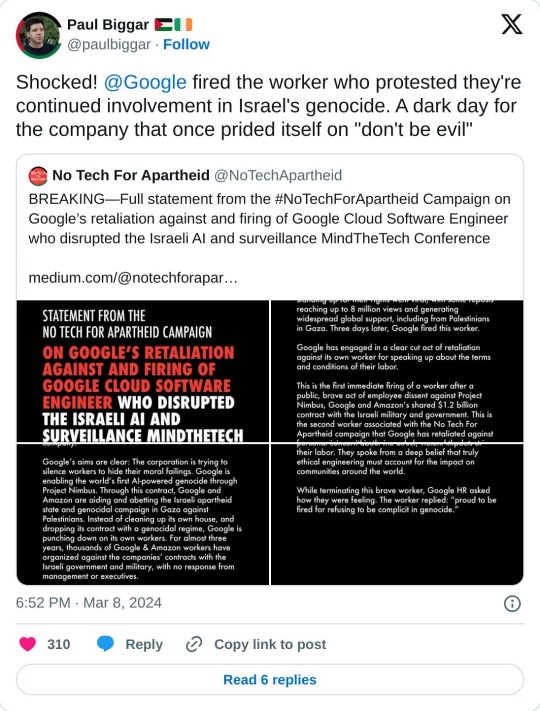
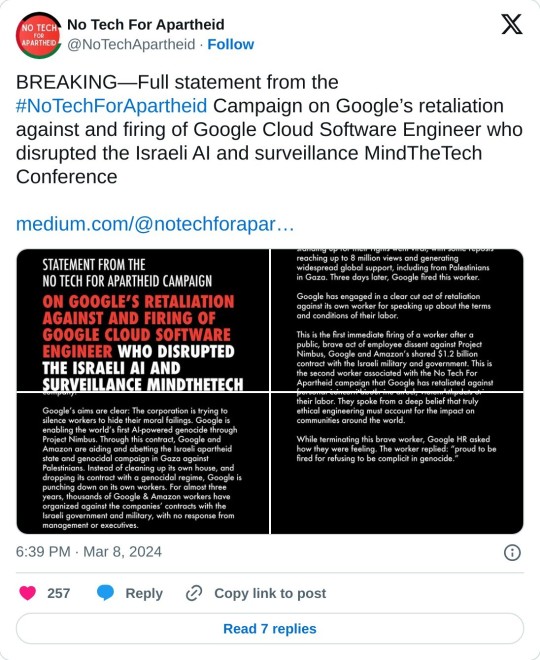
On Monday, a brave Google Cloud engineer spoke up against the corporation’s complicity in Israel’s genocide against the Palestinian people. A video of the worker standing up for their rights went viral, with some reposts reaching up to 8 million views and generating widespread global support, including from Palestinians in Gaza. Three days later, Google fired this worker.
Google has engaged in a clear cut act of retaliation against its own worker for speaking up about the terms and conditions of their labor.
This is the first immediate firing of a worker after a public, brave act of employee dissent against Project Nimbus, Google and Amazon’s shared $1.2 billion contract with the Israeli military and government. This is the second worker associated with the No Tech For Apartheid campaign that Google has retaliated against for organizing within their workplace, and the latest in a series of cases in which Google has retaliated against workers for speaking up about the corporation’s ethical malpractice in a range of business decisions.
While touting the importance of “democratic values” in the workplace, Google is shutting down free speech and silencing debate and dissent among workers within the company.
Google’s aims are clear: The corporation is trying to silence workers to hide their moral failings. Google is enabling the world’s first AI-powered genocide through Project Nimbus. Through this contract, Google and Amazon are aiding and abetting the Israeli apartheid state and genocidal campaign in Gaza against Palestinians. Instead of cleaning up its own house, and dropping its contract with a genocidal regime, Google is punching down on its own workers. For almost three years, thousands of Google & Amazon workers have organized against the companies’ contracts with the Israeli government and military, with no response from management or executives.
As a Cloud Software Engineer on critical technology that enables Project Nimbus to run on sovereign Israeli data centers, this worker spoke from a place of deep personal concern about the direct, violent impacts of their labor. They spoke from a deep belief that truly ethical engineering must account for the impact on communities around the world.
While terminating this brave worker, Google HR asked how they were feeling. The worker replied: “proud to be fired for refusing to be complicit in genocide.”
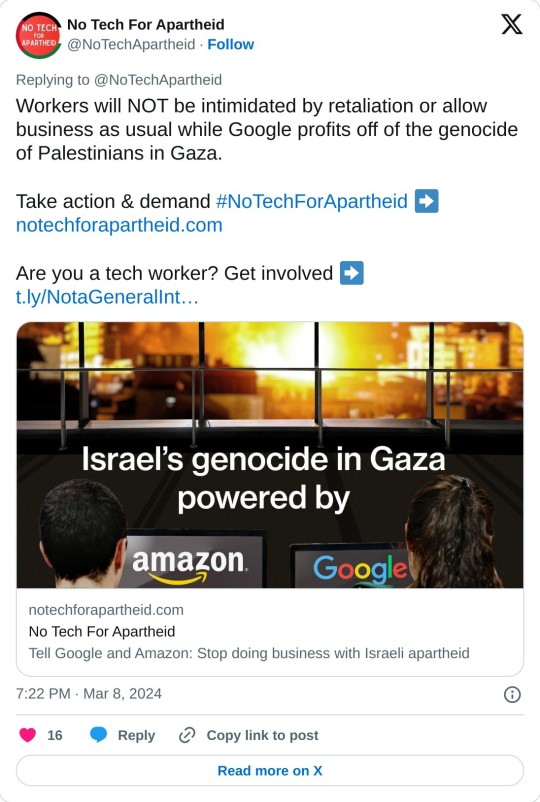
36 notes
·
View notes
Text
Day 61 (2/2)
Zero Dawn Facility
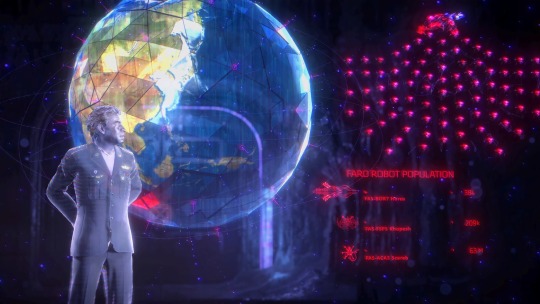
Herres began with a revelation: nothing could save the world from the Faro plague. He went on to detail the projected rapid explosion of their population as they continued to self-replicate, consuming every living thing on the planet and degrading conditions until the air was poison and the lands uninhabitable. There was no hiding from the swarm; they would leave a barren earth behind them and at the first sign of returning life, they would wake from slumber and fuel themselves with whatever they could find. It would take decades to generate the swarm's deactivation codes, but the world had barely more than a year.

Operation Enduring Victory was a lie from the very beginning. There was no hope and there never had been. From the moment Elisabet reviewed Faro's data in Maker's End, she must have known. That explains why the War Chiefs at US Robot Command were so horrified with the idea of Enduring Victory. All they were doing—all those people standing between the swarm and the next city, fed false hope—was buying time for project Zero Dawn.

Then he revealed Elisabet's image, a small glimmer of hope. She was to explain the true purpose of the project in the next theatre. It didn't make any sense—if none of the Old Ones survived the swarm, then how did life continue?
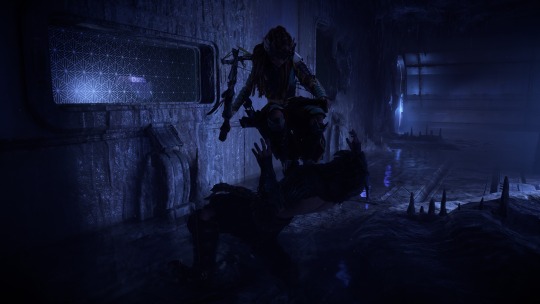
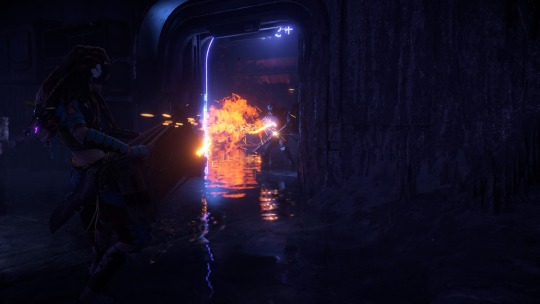
I was right about the Shadow Carja. It seemed that the vents opening gave them other routes down. The kestrels were ignorant of the ruin's true nature, but I knew that once the Eclipse caught wind of the breach, they were certain to start salvaging data for Hades. I couldn't let them find Zero Dawn's secrets before I did.
I took a few of the kestrels out undetected before picking up one of their Firespitters and dispatching the rest.
The rooms were full of recorded interviews with various Zero Dawn 'candidates'. They were scholars, all from disparate fields of expertise. Experts in art and history, in environmental conservation, in robotics and engineering and artificial intelligence. There was a particularly colourful character named Travis Tate who I gathered was some sort of criminal. All of them were requested by Elisabet herself, and all of them had very different reactions to learning that all hope was lost. Anger, resignation, grief, confusion. Many questioned whether the swarm was truly unstoppable, who was culpable (a man named Tom Paech was out for Faro's blood), and why they of all people were chosen for the project.
They were all skeptical about what Elisabet could possibly have come up with to save a doomed world. One named Ron Felder latched onto the idea of a vehicle to take people away from Earth, a 'generation ship'. I never suspected that such a voyage was possible, though Ron didn't seem to think so either, at least that it could save only a handful of people if successful given the resources involved. One of the candidates was even a Faro employee himself, a lead developer of the Chariot line's self-replication procedures. He was overcome with guilt, eager to see his work quashed by some miracle of science.

In the next room, Elisabet's presentation began. She confirmed Herres' assessment of the situation, then expounded her solution.
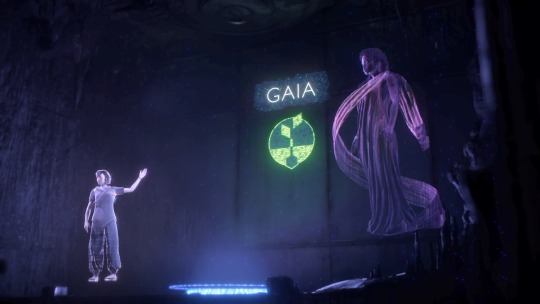
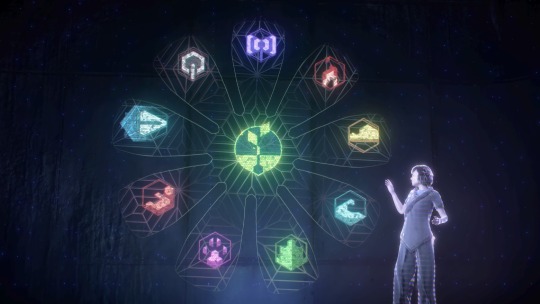
A seed, she called it, from which new life could grow on a dead world: Gaia. An AI—a true AI, she said—engineered to deactivate the Faro robots and grow life on Earth anew. The central intelligence was joined by nine subordinate functions, not AIs in themselves but still complex software systems, each serving a different purpose. It was as their names were revealed in the presentation that some of my greatest questions were answered.
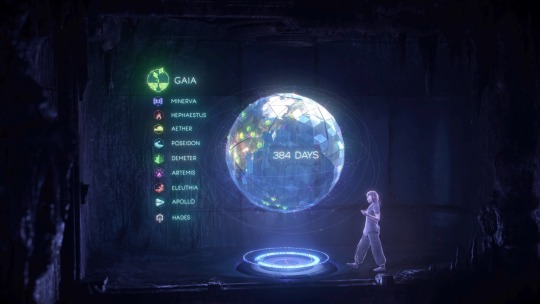
Hephaestus, and Hades. Both of them were part of Gaia, her subordinate functions. But if they were once part of the system, how did Hades end up in the body of a Horus leading a Carja cult, and how did Hephaestus end up scattered across Cauldrons and infecting Cyan?
Only a few of the functions were mentioned: Hephaestus was meant to build the machines of the wilds, Aether to purify the air, Poseidon the water, and Minerva generated the codes that deactivated the swarm decades after the Old Ones fell—and its tower pictured looked just like the Spire. Artemis spawned animals, many of the holographic silhouettes familiar to me from the wilds, and Eleuthia...it spawned human beings in 'Cradle Facilities'. The presentation didn't explain how.
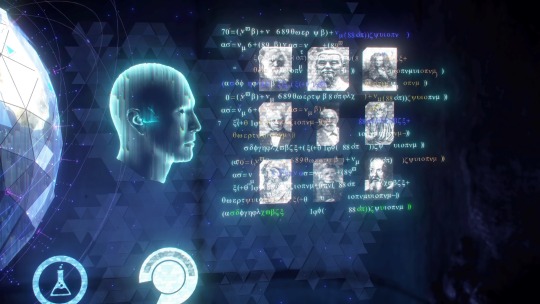
One function stood out to me: Apollo. It was meant to be a repository of all human knowledge that the children of the Cradle Facilities would learn from. The picture showed a Focus used to channel this knowledge, but what happened to it all? Could it still be intact somewhere? Whatever happened, that knowledge never made it to the people of the tribes, and Elisabet's hope that the people of the future wouldn't repeat the mistakes of the Old Ones was dashed.

Elisabet ended her presentation by imploring the candidates to join the project and help Gaia achieve a rejuvenated earth, and I can't deny her words were rousing. It was a beautiful dream, daringly ambitious, perhaps even close to impossible given what little I know about Old World technology. At the very least, creating a 'true' AI was strictly forbidden by all corporations, but at the end of everything, what did those regulations matter? What better to combat a machine of destruction than a machine of creation, a true peacekeeper?
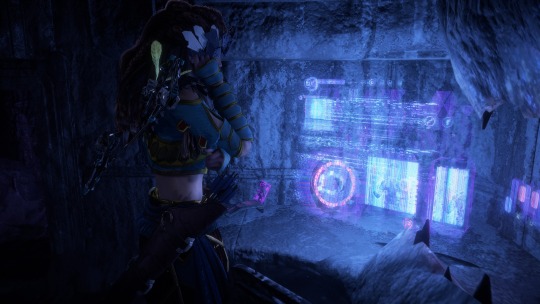
Moving on, I came to another holding area. All candidates who experienced the presentations were given three choices to decide their fate. First, to comply and participate in the project, working with their assigned team to build Gaia and her subordinate functions. If they refused to comply, they would be detained indefinitely, without a chance to reconsider after two days' time. Given they knew the truth about Operation Enduring Victory, they could not be allowed to leave and spread that information. It seemed cruel, but I can understand the need for strict secrecy. If people found out that there was no hope for humanity as they knew it, they would be likely to throw down their arms and try to end their lives as peacefully as possible, instead of in pain and fear in resistance against the swarm.
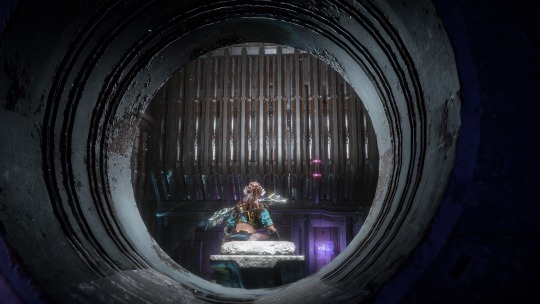
The third option was medical euthanasia; to die painlessly, alone, holding this secret forever. I saw the room where it happened. One bed, cold metal, cold lights striping the walls.
The interviews recorded showed all three reactions. Some were eager to contribute, willing to give all they could for a slim chance to save the future. The Faro employee, for instance, was thankful for a chance to undo his mistakes. Others were more skeptical but still willing to try, while others found the idea ridiculous. Ron Felder thought it even more far-fetched than space flight, calling the whole thing nothing more than a fantasy with a crazy hologram display to match. I gathered he was detained.
Perhaps the most interesting reaction was that of Travis Tate. He called the whole notion of trying to re-engineer the natural world unnatural, even abominable. Another reason that they couldn't let the secret out was that others would agree with him. I suppose I can see his point, but surely it was worth trying. Benefit of hindsight, I guess. Having no conception of what the natural world once was, it's beautiful to me. Maybe to them it would feel wrong, artificial.
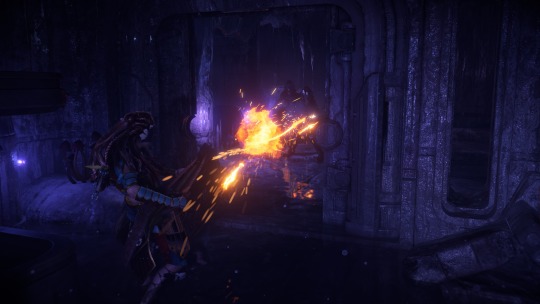
More kestrels further on, all touting Firespitters. Once one was down the rest were easy prey.
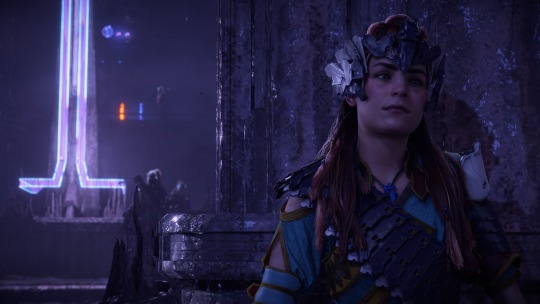
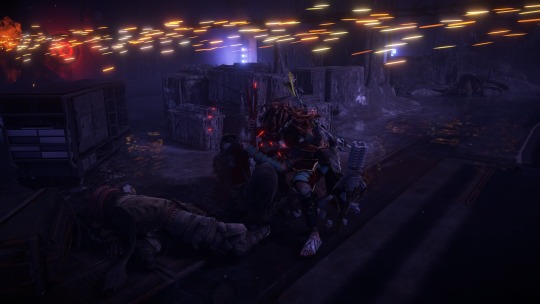
Unfortunately I was right about the Eclipse. The deeper reaches of the ruin were already crawling with them. I was hoping to sneak around and climb the elevator shaft to Elisabet's office above, where the most classified data was sure to be kept, but the entrance was sealed. There was no way I could search for other exits and go undetected. I tried to take out the Eclipse unseen, but was spotted and they called for reinforcements, running in from neighboring chambers and rappelling from the upper level. It was a tough scrap, but there was plenty of cover. I lost them easily in the dark and was able to sneak around. The real problem was that now they knew I was here.
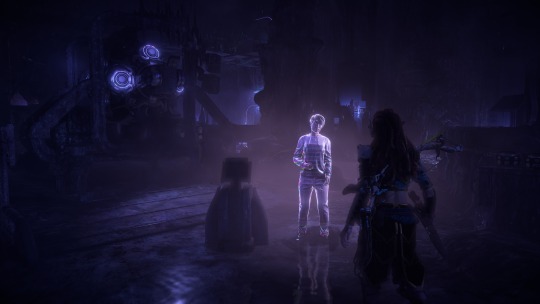
While exploring I came across the workstation for the Hephaestus function. There was a holographic recording of its director, Margo Shen, an ex-colleague of Elisabet at FAS before they both left the company. She explained that their job wasn't to design machines, but to program Gaia to use the tools and data contained within Hephaestus to design machines of her own. Hephaestus was clearly never meant to be intelligent, to feel emotions of its own—so what happened to it?
Sylens suggested it might have gone 'rogue' like the swarm and stopped answering orders. Maybe Gaia is out there, unable to communicate with the tribes or get Hephaestus and Hades back under control. If Hephaestus struck out on its own when the Derangement began, when did Hades escape—the same time?
I recognised some of the mechanical structures and holographic designs I found from Cauldrons, iterated on and grown wild. Everything was beginning to make sense.
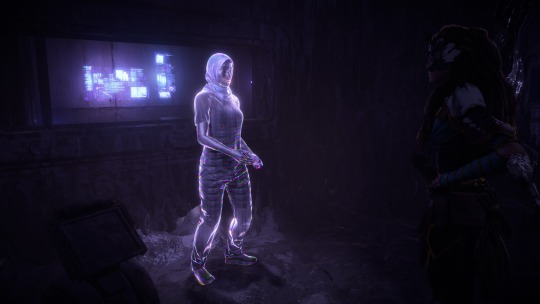
Further on I found a similar recording of the leader of Apollo, Samina Ebadji. She spoke of collating, organising, and storing records of human knowledge across millions of different topics, and building a learning interface where the people of the future could gain that knowledge through a game-like process. Such an important station, authoring what would shape the future of human civilisation—choosing what would be remembered and what should lay forgotten. From the datapoints I discovered, the project was running on schedule and they were planning to store the data in 'synthetic DNA'. If Samina's project didn't fail, then what happened to it?
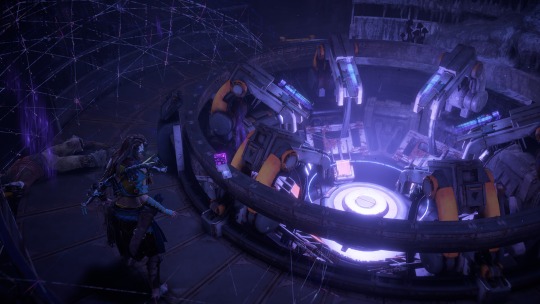
More Eclipse in the next chamber, which I dispatched undetected. I found a recording from General Herres—some sort of testimonial, an apology for the lies and injustices of Operation Enduring Victory. I can't imagine the guilt, but it was the right thing to do. It has to be, or nothing would have survived. The swarm would have swallowed this facility long before Gaia's completion.
In more datapoints I found, Margo and the other function leaders were named 'Alpha candidates'. Back in All-Mother mountain, when the door denied me, it said that the Alpha registry was corrupted. Was it trying to match my identity to the list of Alpha candidates on the project? If that piece of data was part of all Zero Dawn's associated facilities, I suspected I could find it here as well.
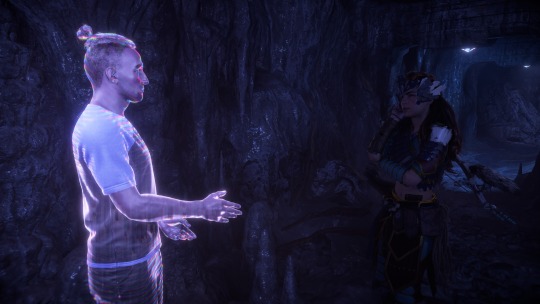
Next, I entered Hades' old domain and listened to an introduction by Travis Tate, the eccentric 'hacker'. From what I could gather, his crimes consisted of exposing the dark secrets of corporations and orchestrating sort of technological pranks on a global scale. Elisabet trusted him enough to put him in charge of the Hades function, but judging by what's happening now his work left something to be desired.
Hades was Gaia's extinction function. 'Apocalypse on speed dial', Travis called it, the idea being that Gaia was unlikely to engineer a perfect Earth-like biosphere on the first go. It was a delicate balance to recreate, and in the event of firestorms and poison skies irrevocably locked in a cycle of chaos, Hades was built to temporarily take control of the system away from Gaia and undo terraforming operations, returning Earth to the barren rock it was when the swarm subsided so Gaia could begin again. One of the datapoints spoke of a facility where Gaia and Hades were tested together, where Travis tried to engineer the correct feedback and reward behaviour to ensure the entities passed control back and forth as desired. It seems that of all the subordinate functions, Hades was the most intelligent, as it needed to be able to manipulate the other functions in event of a catastrophe. Though, again, it was never intended to possess emotional responses.
But Gaia succeeded long ago, why would Hades wake now? Did it try to take control, causing Gaia to expel it from the larger system? If it no longer had Gaia's tools and functions available to it, it seems logical that its next best course to undo Gaia's work would be to wake the Faro bots themselves to resume their gruesome conquest. Thanks for that, Travis.
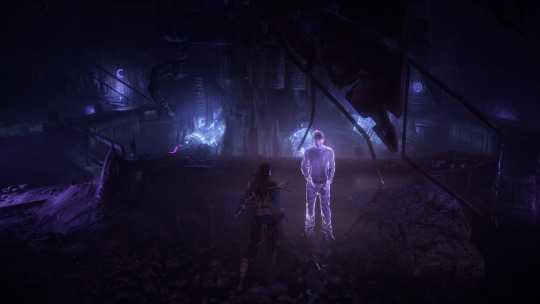
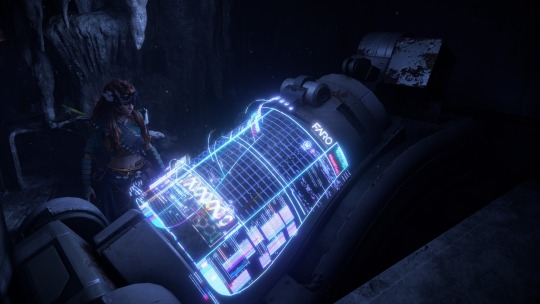
Next on my journey to Elisabet's office, I passed Eleuthia's headquarters and listened to an address from its leader, Patrick Brochard-Klein. He spoke of perfecting the technology to create humans inside machines, and to build 'servitors', robotic guardians resembling humans themselves, who would care for the new generations inside their Cradles. He stressed that this was a project of preservation, not 'genetic engineering', and spoke of regulations around...cloning, which he refused to transgress. Clone, as in copy.
There were many 'ectogenic chambers' inside the workshop—the machines from which new humans were spawned. The logs I found said they were donated by Far Zenith, whose conception of the technology was far ahead of public scientific records. I've come across a few datapoints mentioning the organisation before, sometimes called simply 'FZ'. They were a mysterious group of billionaires (a word for the wealthiest and most powerful of the Old Ones), their identities unknown to all outside the group. They had their own 'think tanks' and scientists developing technology in secret, much like a corporation, or a co-merging of many corporations, using the exhaustive profits of them all. I know they bought a space station called the Odyssey, though when I first read this I didn't understand what it meant. From Ron Felder's tirade, I knew then. A structure built to travel away from this world, through the stars. With the most advanced technology and near-infinite resources available, could they have succeeded?
Thoughts gathered in the back of my mind that I wished to ignore. It was clear to me that All-Mother mountain must have been one of these Cradle facilities, given the ruin inside and the bunker door, answerable to Elisabet. Every Nora myth pointed to this too: the life-giving goddess within, and its battle against the Metal Devil. Perhaps some knowledge of the Old Ones did survive and was imparted to the first new people of the earth. And of course...I came from that mountain. I was found just outside its doors, alone. I suppose some of the first people might have remained behind the door. Perhaps there was a schism long ago, or they're protecting the Apollo archive inside. Maybe helping Gaia to operate. But why wouldn't they try to communicate with the world outside?
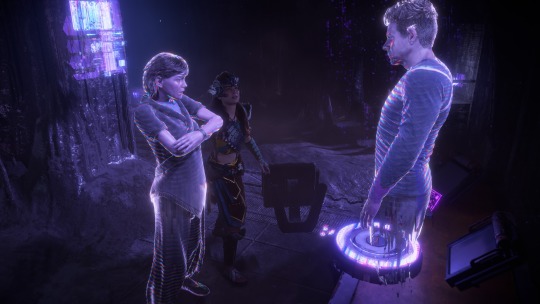
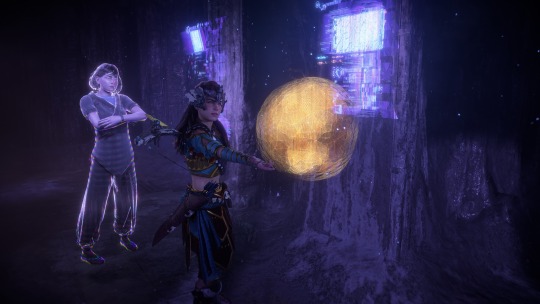
Finally, I made it to Elisabet's workshop. There were a number of preserved recordings inside. The first, an argument between Elisabet and Ted. I'd hazard a guess that this happened often. To think that he still had the gall to argue with her after everything he did...I suppose she had to put up with it considering he was funding the operation.
Faro was disputing Elisabet's assertion that Gaia had to have complex emotional capabilities to properly rebuild and safeguard the world. She needed 'skin in the game', Elisabet said—I suppose if she felt no emotional connection to life, human or otherwise, she'd have no incentive to put their needs first, or the means to conceptualise their needs accurately to begin with. Intelligence and emotion go hand in hand, as Cyan explained.
Faro was wary of 'repeating past mistakes'. I'm don't think he was only talking about the swarm, because they had no emotional capacity themselves, only strategic intelligence. He wanted a kill switch, which I gathered ended up being Hades—a way to wrest control from a version of Gaia gone wrong. Gaia herself chimed in and agreed with him, understanding her own volatility. Her voice was beautiful: smooth and deep and full of care. Maybe it was only a clever trick of programming in those early days, but she sounded like she had developed emotions already. Her projection didn't match the figure I saw in Elisabet's presentation though. She was just a golden ball of liquid light.
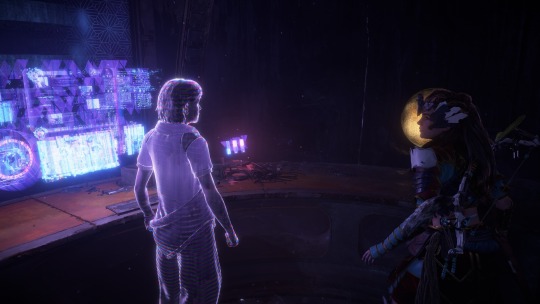
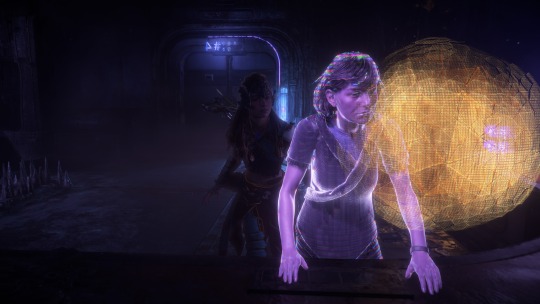
More recordings, the first of Elisabet and Gaia discussing her emotional responses to mass extinction events of the ancient past. It seemed her development was going well, but it was cut short. In the final recording, Elisabet was panicked, erratic, irritable. She was trying to lock everything down and evacuate the facility before the swarm hit, evidently ahead of projected schedule. Gaia comforted her, and for the first time I witnessed a moment of weakness in Elisabet. She lamented all the lives lost in Enduring Victory—all those deaths, those lies, would be for nothing if she couldn't complete Gaia in time.
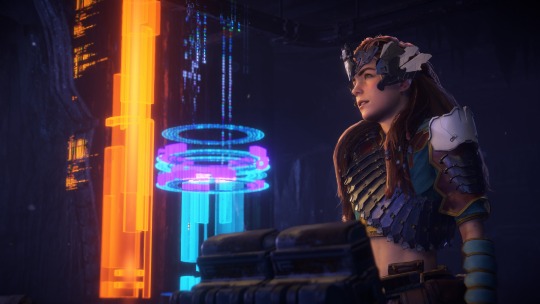
In Elisabet's office, along with plenty more data to sift through, I found just what I was looking for: an intact copy of the Alpha registry. I made the mistake of voicing my wish to meet my mother inside All-Mother mountain's Cradle, which Sylens shut down with derision. He said there would be no people behind that door, only machines. I refused to believe it.
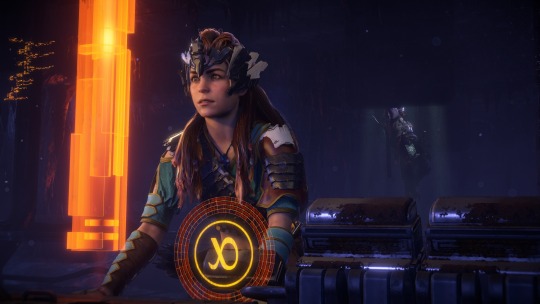
As I was downloading a copy to my Focus, more Eclipse soldiers began to descend from above. I couldn't leave until the transfer was complete, and just as it did I went to make my escape, but behind the glass was Helis. We locked eyes for the first time since the Proving. Before I could react, he threw a bomb and detonated it in front of the glass, blasting it inward and knocking me back against the desk.

I only fell unconscious for a few moments, but it was enough for Helis to land at my side, glare smiling with those pale, manic eyes, and kick me back into the darkness.
#god i was dreading writing this one. so much lore#hzd#horizon zero dawn#aloy#aloy sobeck#aloysjournal#hzd remastered#photomode#virtual photography#horizon
12 notes
·
View notes
Text
The Chinese government announced Tuesday it is opening an investigation into Google in response to 10 percent tariffs imposed on Chinese imports by US president Donald Trump. Minutes after the tariffs went into effect, China’s State Administration for Market Regulation said it was probing the American tech giant for potentially violating the country’s anti-monopoly law.
The Chinese government may have strategically chosen to go after Google because it has limited operations in the country, ensuring the hit to the US tech giant would be relatively minimal. The move gives China plenty of room to escalate if the Trump administration announces further tariffs or other trade measures. Google declined to comment.
China also announced it was putting more restrictions on the sale of some critical minerals like tungsten and slapping additional tariffs on farm equipment, pickup trucks, liquified natural gas, coal, and other goods from the US. While the US isn’t reliant on China for all of the impacted minerals, the country does control the majority of the world’s tungsten supply, which is used in light bulbs, semiconductors, and ammunition.
“China’s position is firm and consistent. Trade and tariff wars have no winners,” China’s Ministry of Foreign affairs said in a statement Sunday shortly after the tariffs were announced. “This move cannot solve the US’s problems at home and, more importantly, does not benefit either side, still less the world.”
China has kept Google in its crosshairs during the ongoing trade war with the US over the last few years. In 2020, the government reportedly considered opening an antitrust investigation into Google's Android business, according to Reuters. The deliberations followed a complaint from Chinese telecommunications giant Huawei, which was targeted by Trump during his first term.
Because of US sanctions, Huawei is unable to use American-made software like Google Mobile Services, a suite of tools widely used across the smartphone industry. The restrictions forced the company to develop its own operating system called Harmony OS.
But most smartphones around the world still run on Android, which has sparked competition investigations in a number of countries, some of which have led to concessionary changes designed to give consumers and app developers more choices and lower fees. In China, several smartphone makers continue to rely on an open source version of Android.
This past December, Chinese authorities also opened an anti-monopoly investigation into Nvidia, the chipmaker whose GPUs play a crucial role in the development of generative AI and have become a significant source of trade sparring between the US and China. The announcement came soon after the Biden administration further tightened China’s access to high-end semiconductors.
About 15 years ago, Google stopped offering a search experience tailored for China following a series of Chinese government-linked cyberattacks against it and other US companies. Google debated reentering China with a search engine about seven years ago, but the project was scuttled following protests from some employees concerned about supporting Chinese surveillance and censorship.
Google has also stopped short of directly selling cloud technologies in China, as local laws could threaten the privacy and security assurances it offers to customers in other markets. Other Google services such as YouTube are blocked by Chinese internet regulators.
China has allowed domestic companies to buy advertisements through Google so that they can market to customers abroad. But the revenue from those deals is relatively small, and China didn't even garner a mention in parent company Alphabet's annual financial report last year. That stands in contrast to Meta, which lists China among its biggest markets in terms of advertiser location and said last year that China-based advertisers account for 10 percent of its annual revenue.
5 notes
·
View notes
Text
Python for Beginners: Launch Your Tech Career with Coding Skills
Are you ready to launch your tech career but don’t know where to start? Learning Python is one of the best ways to break into the world of technology—even if you have zero coding experience.
In this guide, we’ll explore how Python for beginners can be your gateway to a rewarding career in software development, data science, automation, and more.
Why Python Is the Perfect Language for Beginners
Python has become the go-to programming language for beginners and professionals alike—and for good reason:
Simple syntax: Python reads like plain English, making it easy to learn.
High demand: Industries spanning the spectrum are actively seeking Python developers to fuel their technological advancements.
Versatile applications: Python's versatility shines as it powers everything from crafting websites to driving artificial intelligence and dissecting data.
Whether you want to become a software developer, data analyst, or AI engineer, Python lays the foundation.
What Can You Do With Python?
Python is not just a beginner language—it’s a career-building tool. Here are just a few career paths where Python is essential:
Web Development: Frameworks like Django and Flask make it easy to build powerful web applications. You can even enroll in a Python Course in Kochi to gain hands-on experience with real-world web projects.
Data Science & Analytics: For professionals tackling data analysis and visualization, the Python ecosystem, featuring powerhouses like Pandas, NumPy, and Matplotlib, sets the benchmark.
Machine Learning & AI: Spearheading advancements in artificial intelligence development, Python boasts powerful tools such as TensorFlow and scikit-learn.
Automation & Scripting: Simple yet effective Python scripts offer a pathway to amplified efficiency by automating routine workflows.
Cybersecurity & Networking: The application of Python is expanding into crucial domains such as ethical hacking, penetration testing, and the automation of network processes.
How to Get Started with Python
Starting your Python journey doesn't require a computer science degree. Success hinges on a focused commitment combined with a thoughtfully structured educational approach.
Step 1: Install Python
Download and install Python from python.org. It's free and available for all platforms.
Step 2: Choose an IDE
Use beginner-friendly tools like Thonny, PyCharm, or VS Code to write your code.
Step 3: Learn the Basics
Focus on:
Variables and data types
Conditional statements
Loops
Functions
Lists and dictionaries
If you prefer guided learning, a reputable Python Institute in Kochi can offer structured programs and mentorship to help you grasp core concepts efficiently.
Step 4: Build Projects
Learning by doing is key. Start small:
Build a calculator
Automate file organization
Create a to-do list app
As your skills grow, you can tackle more complex projects like data dashboards or web apps.
How Python Skills Can Boost Your Career
Adding Python to your resume instantly opens up new opportunities. Here's how it helps:
Higher employability: Python is one of the top 3 most in-demand programming languages.
Better salaries: Python developers earn competitive salaries across the globe.
Remote job opportunities: Many Python-related jobs are available remotely, offering flexibility.
Even if you're not aiming to be a full-time developer, Python skills can enhance careers in marketing, finance, research, and product management.
If you're serious about starting a career in tech, learning Python is the smartest first step you can take. It’s beginner-friendly, powerful, and widely used across industries.
Whether you're a student, job switcher, or just curious about programming, Python for beginners can unlock countless career opportunities. Invest time in learning today—and start building the future you want in tech.
Globally recognized as a premier educational hub, DataMites Institute delivers in-depth training programs across the pivotal fields of data science, artificial intelligence, and machine learning. They provide expert-led courses designed for both beginners and professionals aiming to boost their careers.
Python Modules Explained - Different Types and Functions - Python Tutorial
youtube
#python course#python training#python#learnpython#pythoncourseinindia#pythoncourseinkochi#pythoninstitute#python for data science#Youtube
3 notes
·
View notes
Note
Any interesting colony ships (doesn't have to be human) you you've thought of? This ask is an opportunity to talk about them :).
Like an especially hostile planet, or first contact with an intelligent species, etc.
World class mistake, letting me yap even more :3
Real quick I’m gonna explain the different strategies the Enithian colony ships used. The vast majority of colony ships used cryofreeze, and the few that were full generational ships don’t currently have any callbacks. The cryofreeze ships had a few main strategies for waking up their crew. These include:
-hard coded wake-up date- currently the most successful strategy (aka the one with the most survivors). Points of failure would, presumably, be degradation to the structure of the ship, the mechanics of the pods, and the bodies themselves.
-soft-coded wake-up date- another generally successful strategy that occasionally causes strange results. Points of failure include degradation to the hardware the code is held on, degradation of the software, and incorrect timing for reaching the planet and preforming wake-ups. This is all in addition to the problems from the hard-coding. Most of the Enithian coding for these ships was self-repairing. Essentially extra code was added on to automatically fix any degradation issues to the code. However, there were many times where the self-repairing code went haywire and started removing healthy code, or mutated and repeated unhealthy code until the whole system crashed. There was also at least once where the code became so lengthy and mutated that a sapient ai popped out. More on that later.
-partial generational ships and shift-work ships- either the ship has a couple of people who have a family. Like an entire lineage. In order to wake the rest of the crew up once they get there. Or people in the crew wake up in shifts over the years and go back into cryofreeze after a certain age. Or a mix of the two, where people keep an eye on the ship, raise their kids to do the same, and then they go back to cryo once they get old enough. And then their kids go into cryo once they get old enough. Etc. these strategies are not nearly as effective as the others. The shift-work strategy has like. A handful of ships that survived. But the partial generational strategy only has one ship that managed to accomplish their goal and they weren’t doing too great by the end of it.
Alright failed step one you know the rest isn’t gonna be any shorter
SO.
Enithian colony ships had the traditional naming scheme of 'noun of city.' Dawn of Shelure, Announcer of Telir, and Herald to Rrmet are all examples.
The Dawn of Twahkla was the Enithian colony ship sent to Bitriem, and was the first to encounter sapient life. It was one of the last push-engine trolleys produced by Enith in the First Enlightenment. All other trolleys afterwards were pull engines instead.


It's colonists managed to successfully set their wormhole gate and land on Bitriem, and slowly went about setting up their colony. It was several months before they encounter the sapient natives, the bitriem. The Enithians named the planet, and then gave the people the same name.
Very early interactions were limited, because most of the colonist were frightened by the size of the Bitriem. Bitriem at the time were largely nomadic because of the harsh conditions of the planet. The colonists had set up right in the area that the Bitriem migrated through, rather than the places they stayed in seasonally. As such, the two groups rarely interacted, and what interactions did happen were most neutral. This did, of course, change for the worse when the colony regained contact with Enith and started devouring resources.
The most unexpected part of the Bitriem colony is related to the wake-up. The Dawn had a soft coded wake-up, so when the colonists were woken they quickly found the code to be a mess. The self-repair had made a lot of strange choices, and the code was unrecognizable from how it started. They had a lot of errors when working on the ship, things the soft coding was supposed to control seemed to go off at random times, and they found they could no longer edit the code themselves.
Then one day, after contacting Enith and receiving an update on the situation there (that included a language pack), the ship started talking.
The code had gotten so nonsense and idiosyncratic that a sapient AI had popped out. It had been alone for who knows how long on the trip, and had been watching it's colonists from the moment they woke up. He’s still around, just transferred to a different ship. He just went by Dawn of Twahkla for a long time, but has since changed his name to Midday.

No real avatar, apparently he’s more interested in exploring space than 3d modeling.
The ship sent to Teth Tias is another interesting story, because it never actually reached the planet. Teth Tias was in its space age when the colony ship finally reached the system, and they actually managed to catch it right before the crew would have woken up naturally.

The Dusk on Rritet had a hard-coded wake-up, but the crew were actually woken up when they were intercepted by a Tias patrol on the edge of the system. Teth Tias at the time had managed to reach a few neighboring systems, and had discovered sapient life in one of them.
So seeing another sapient species just. Appear. From the object they’ve been watching for centuries is REALLY weird. They took the crew to one of their in-system colonies to question them, but one of them still managed to get a message out to Enith.
This is after Enith went through a really rough war with a couple of groups on Zornxia, so when they get a message saying “we’re awake, we got found by some guys, dunno what’s going on,” followed by no further contact Enith absolutely assumed the worst. That with the whole “we want everybody under our power” phase Enith was going through resulted in the longest and bloodiest war that was ever seen on a galactic scale. Teth Tias was the one to build the wormhole for the colonists, but Enith didn’t actually care about finding out what was going on.
Teth Tias and Enith are still fairly hostile to each other to this day, and while Teth Tias has managed to secure its own multi-system government, Enith still resides as the big boss of the galaxy.
But uhhh those are the two most interesting ships I have rn. There's another soft-coded ship that may have resulted in a sapient AI, but if that guy's still around then he's escaped somewhere on the internet.
#why did this get so long.#also: it turns out I really enjoy drawing spaceships. I guess?#my art#little bird worldbuilding#greetings from enith#where is teth tias#worldbuilding#spec bio#sci-fi#spaceship#alien#I shouldn’t have started playing halo.#I see her everywhere#(the pillar of autumn)
10 notes
·
View notes